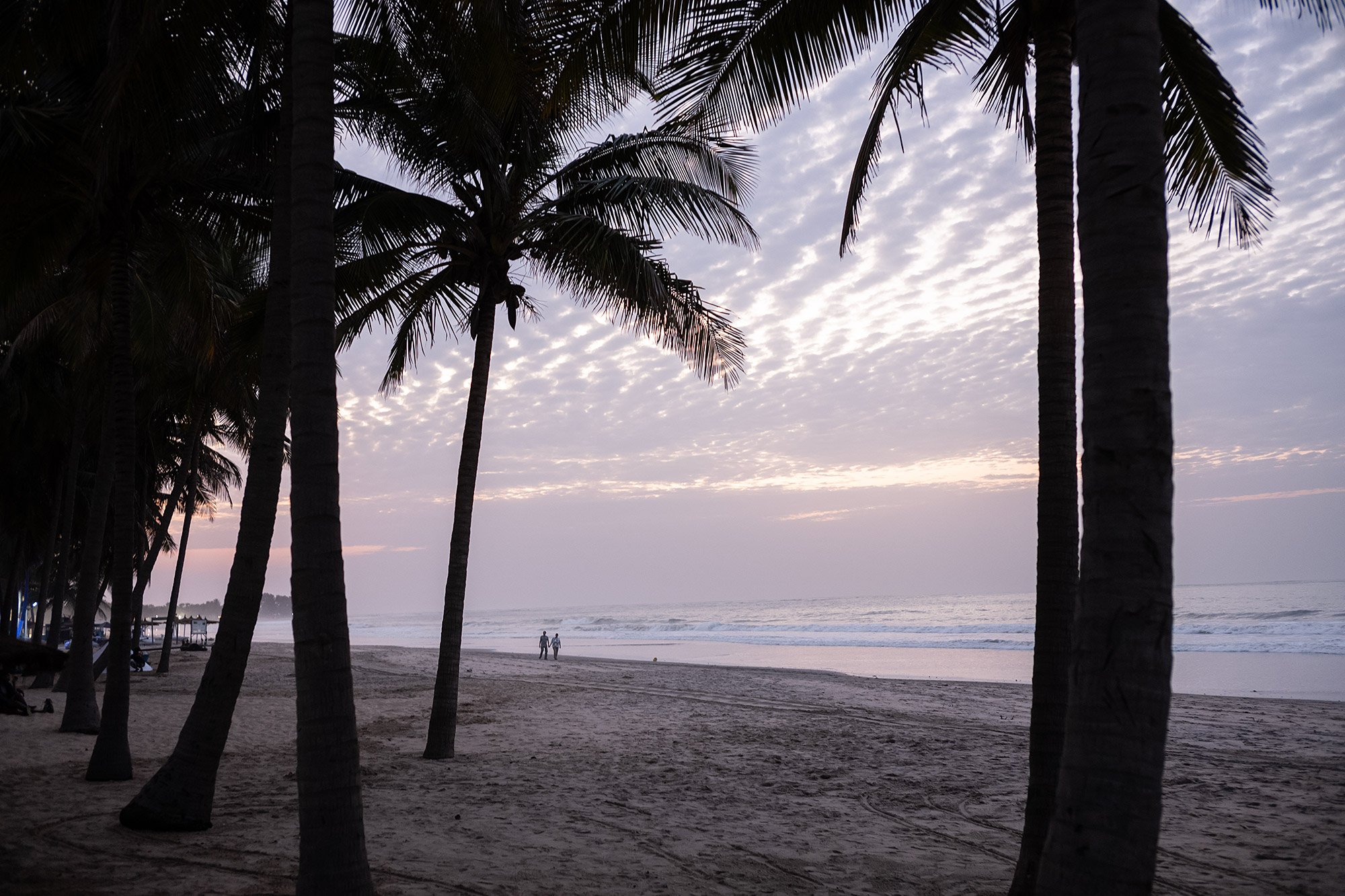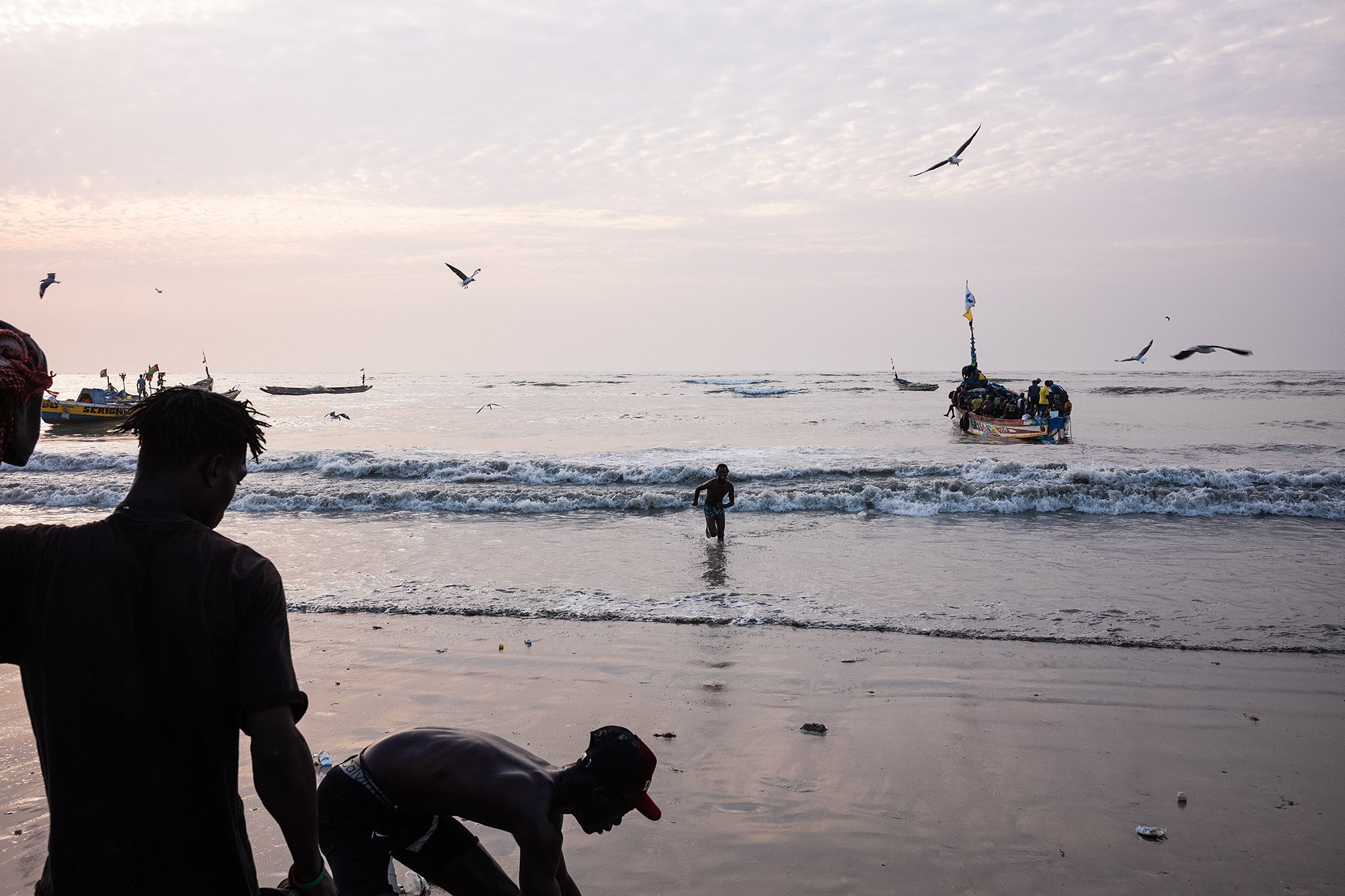
The Gambia chapter one
The journey to Serrekunda.
Ibrahima arrives on the narrow street where I live just as I come down. It’s dark; the sun won’t rise for a few hours.
We’re on our way to The Gambia. For the next four days we have an aggressive schedule. I’m hoping to squeeze as much as I can into a long weekend before heading back to Dakar and work.
We drive on through the early morning on a sealed, two-lane road. It’s the hour for buses and trucks; service stations and toll booths show signs of life. At roundabouts ghostly figures appear to show their wares to passengers and other passing by. People stand on the edges, waiting on buses to pick them up.
The day brightens around 07h, the sun rising before us as we travel east. We pass small towns, each with a prominment mosque near the center. We stop for coffee and water at a gas station. In three hours we’re in Kaolack. From here, roads lead west to Mali and Benin, south to The Gambia. Traffic is heavy. Humans line the roads.
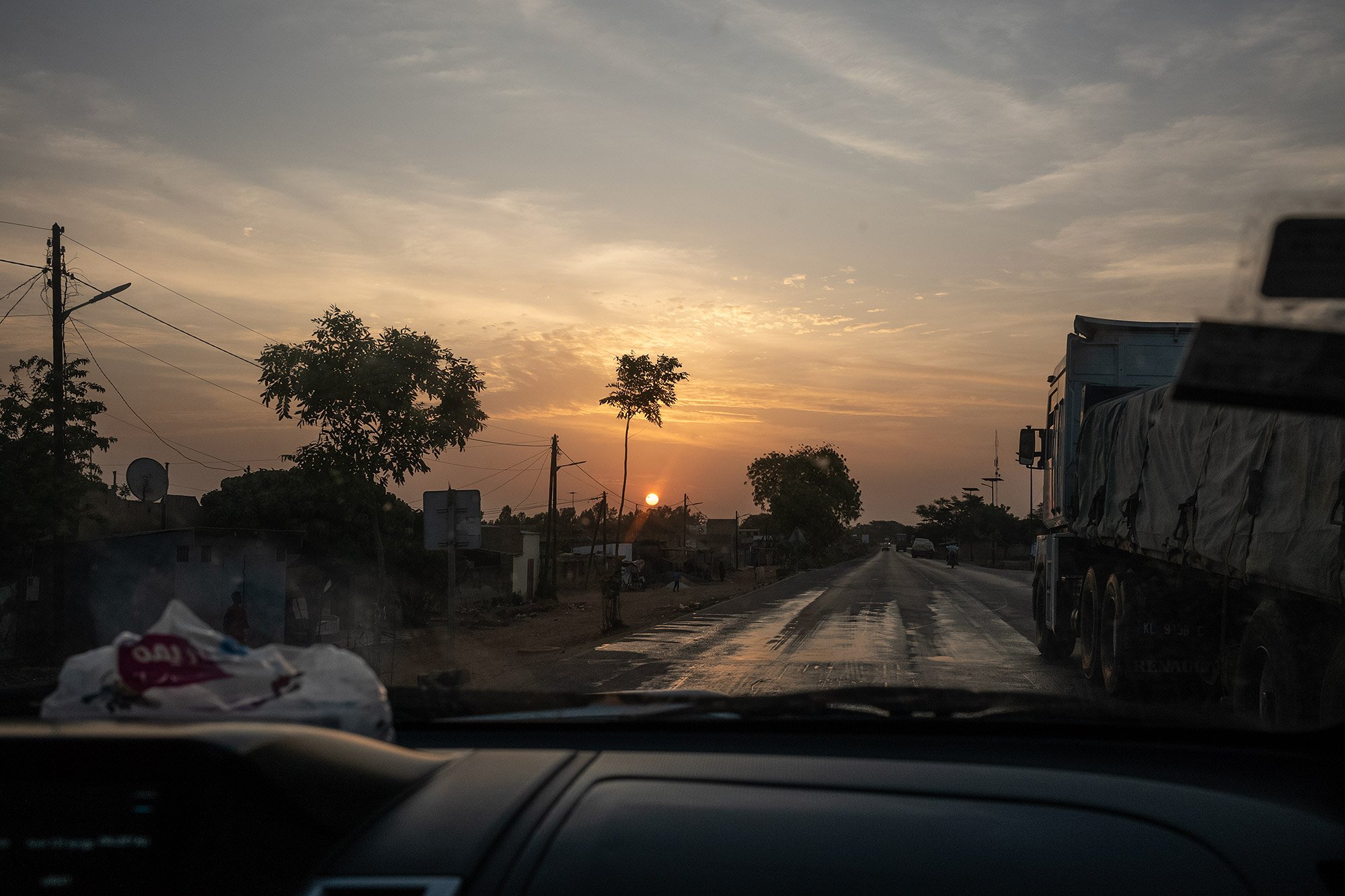
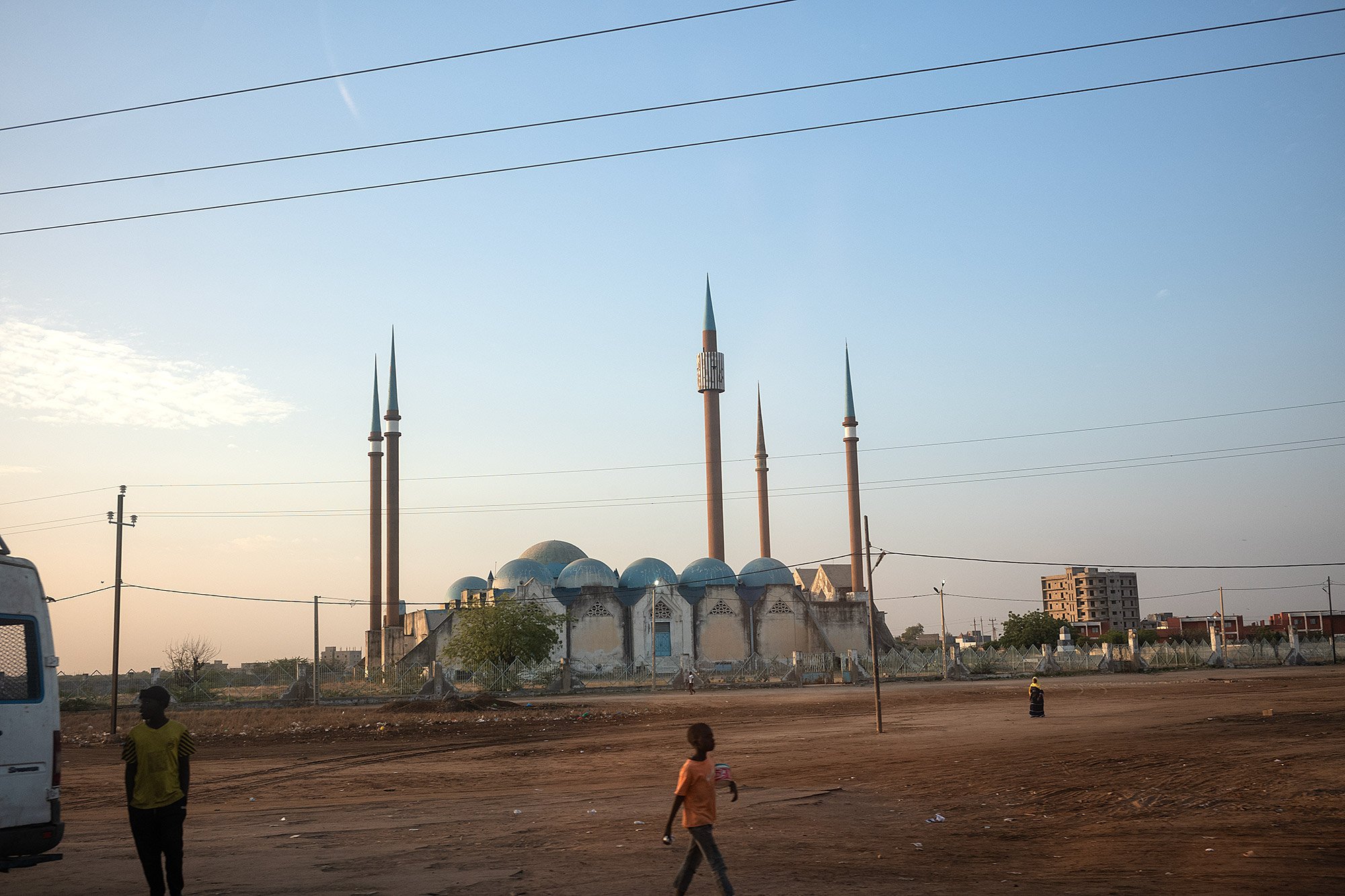

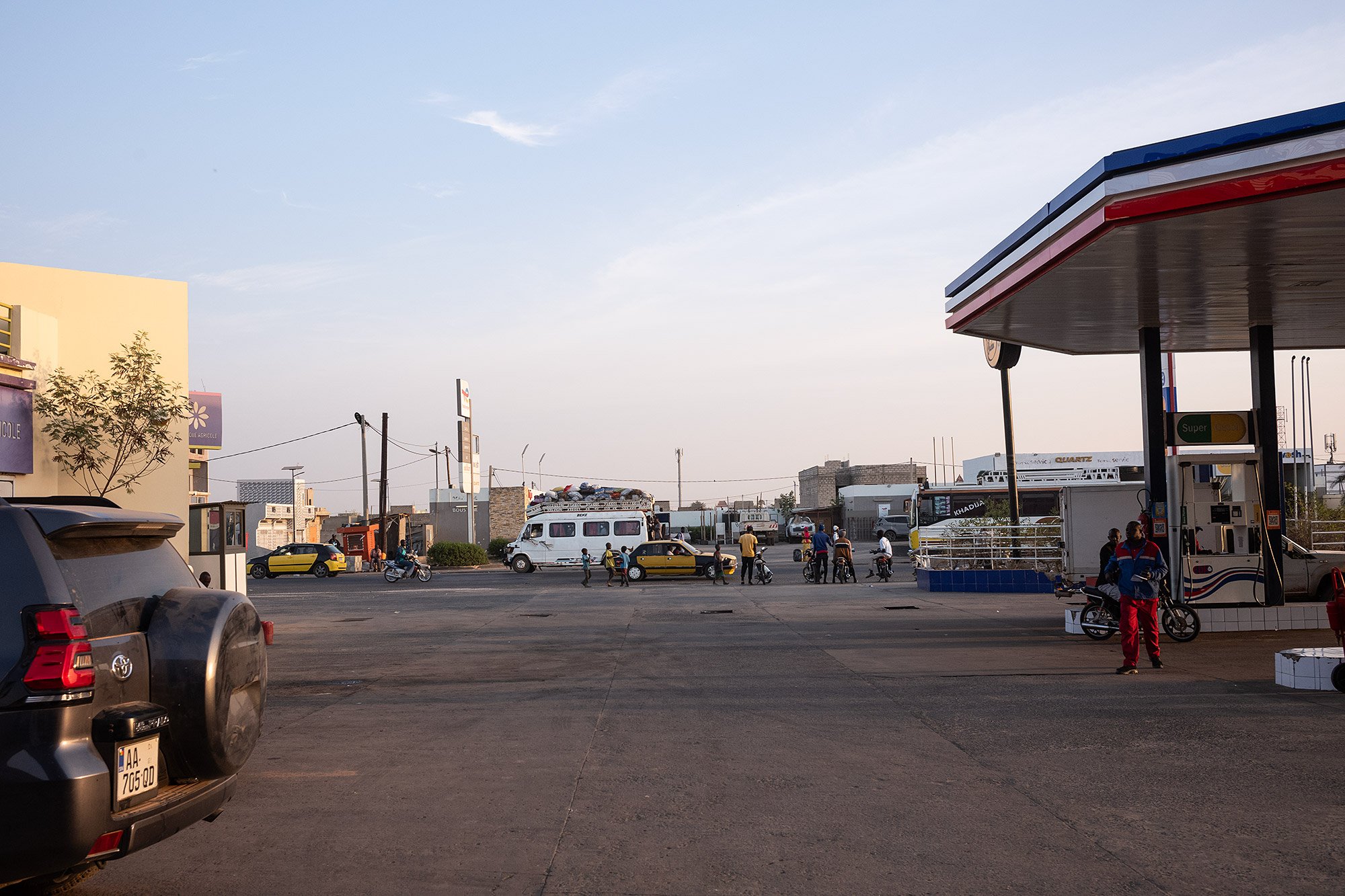

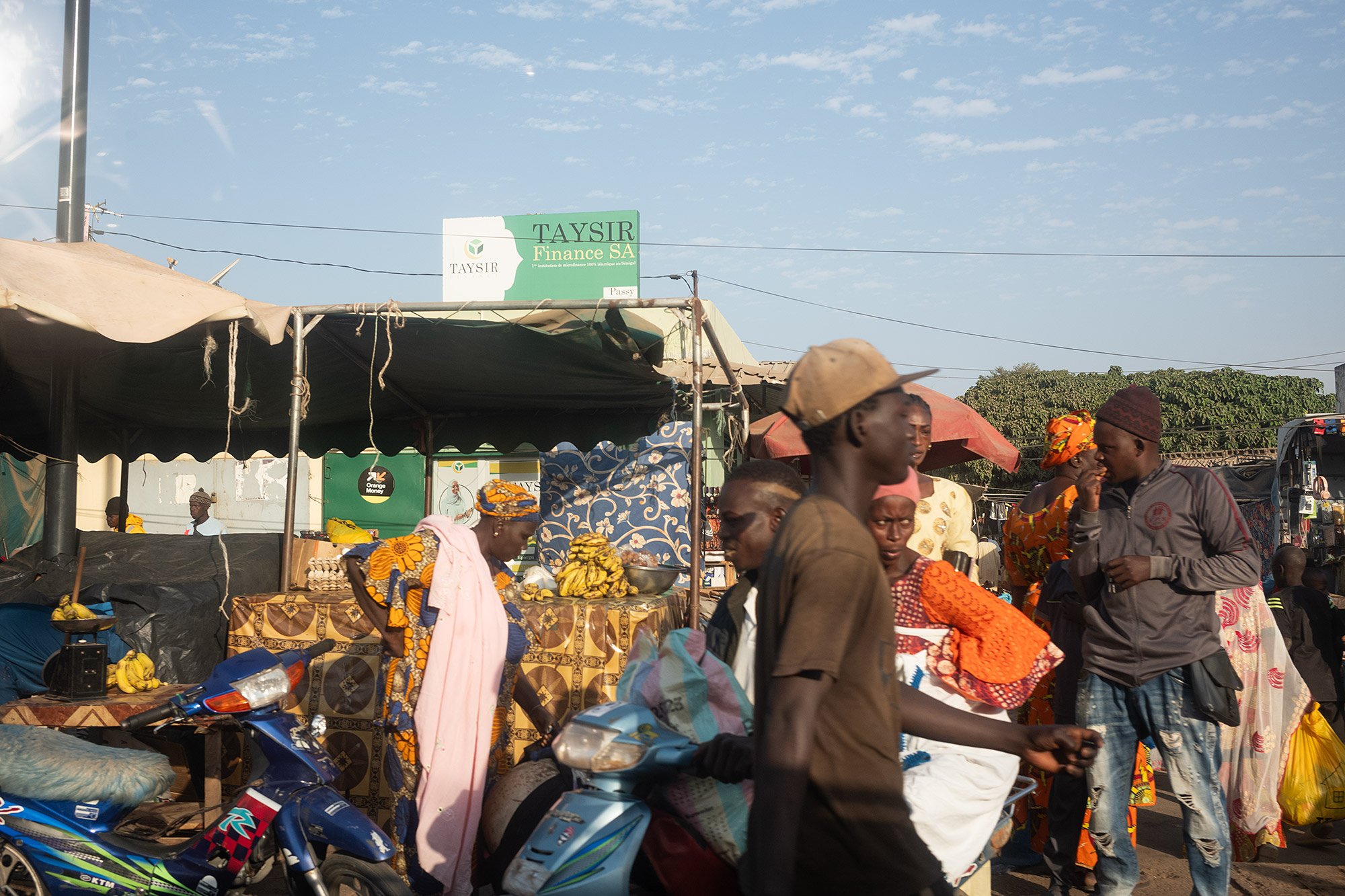
I ask Ibrahima about himself. He has a brother who works at a sugar factory and a sister who is married but not working. A second sister has already passed. He has three children, but seems reluctant to tell me he’s married. He tells me it’s easier without a woman. He asks if I’m married or have a girlfriend. I reply no to both. He nods, knowingly.
Women sell fish on the side of the road, laying them out on the tar. We pass acacia trees and mango groves and peanut farms. Byt he side of the road, peanuts are shelled by machine. Huge mounds of shells pile up by them. He tells us we’ll stop to take a look on the way back. This morning we’re on a schedule.
We approach a horse-drawn cart and start to slow down when a passing Toyota clips us from behind. I hear a slam as we’re driven off the road into the trees. I look over at Ibrahima. His eyes are wide as if in shock. Are we ok, I ask.
He looks up at the white Toyota driving ahead and guns the engine. We pull out of the brush, branches grabbing at the car as if unwilling to let us go, and give chase. The Toyota eventually slows and pulls up by the side of the road. We pull up behind it.
Two army men emerge and words are exchanged. I look back down the road. Traffic has stopped. A man has approached and more words are exchanged. He had flipped his truck while trying to avoid the oncoming Toyota when it passed us. That’s the sound I had heard.
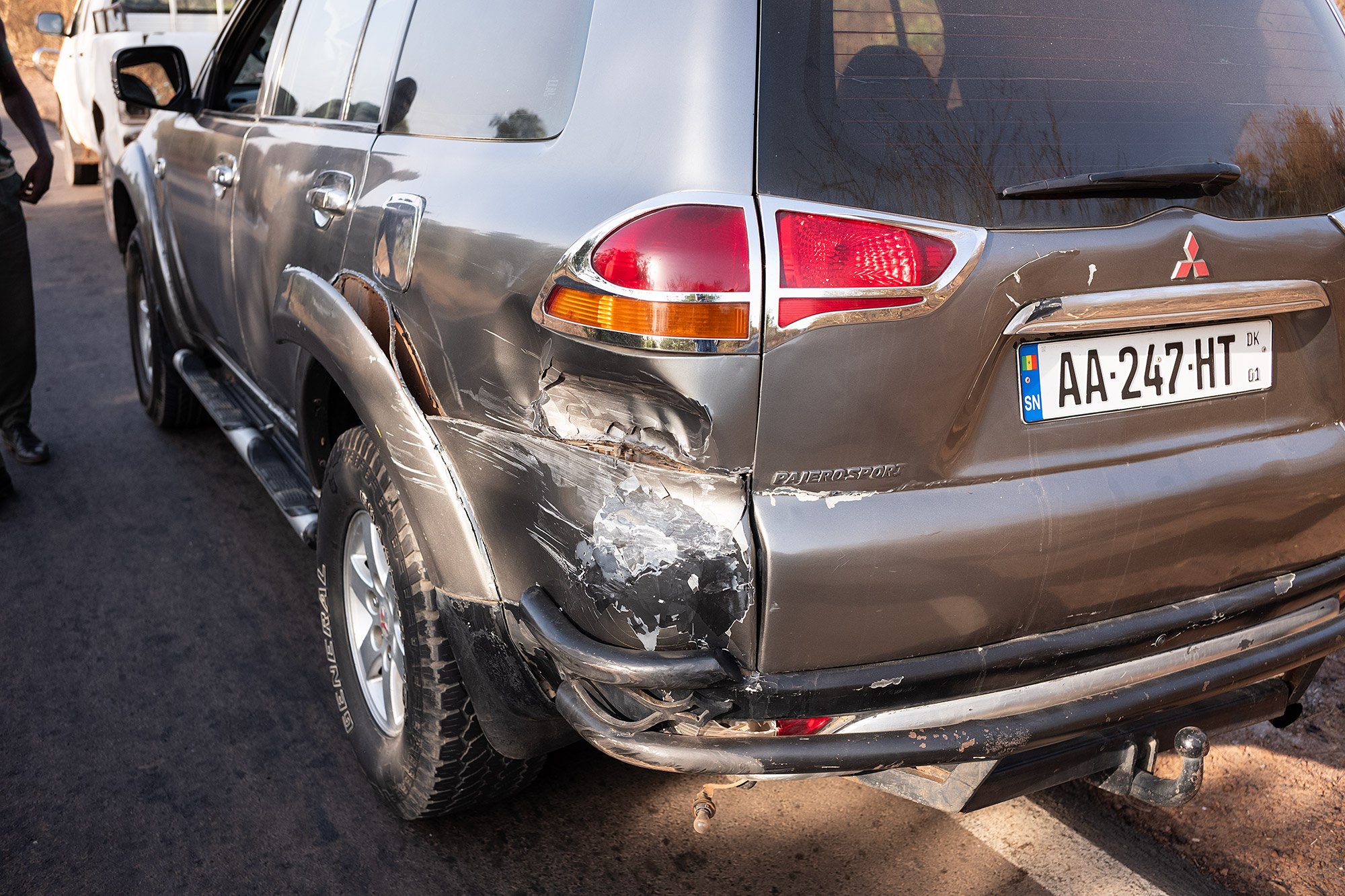

I follow everyone as they walk back down the road to survey the damange. The truck has completely taken over the road, its cargo spilled out before it. Long grooves int the pavement show how far it has slid. The windshield is cracked and kicked out onto the dirt. It’s a wonder that no one is seriously injured.


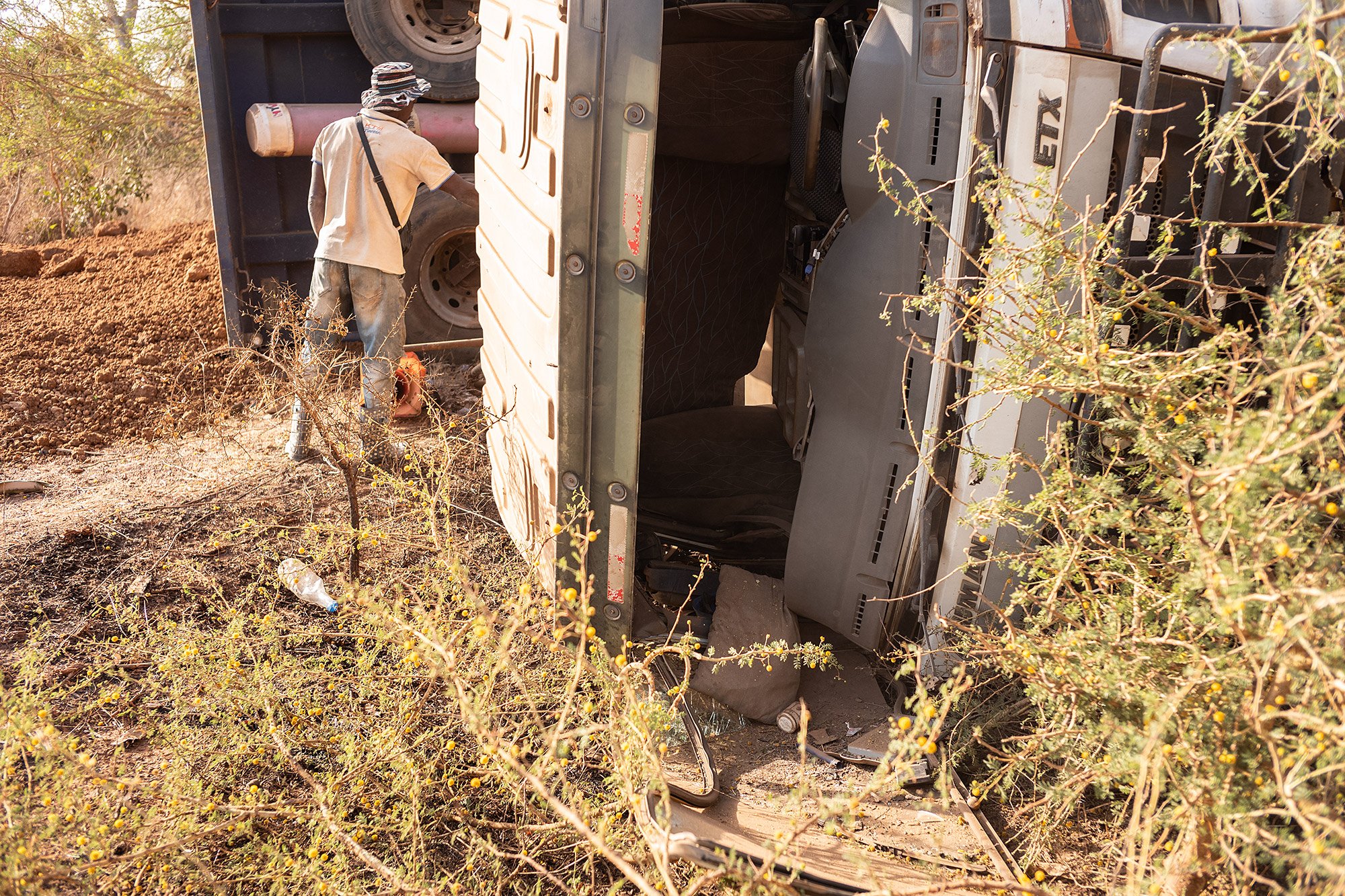
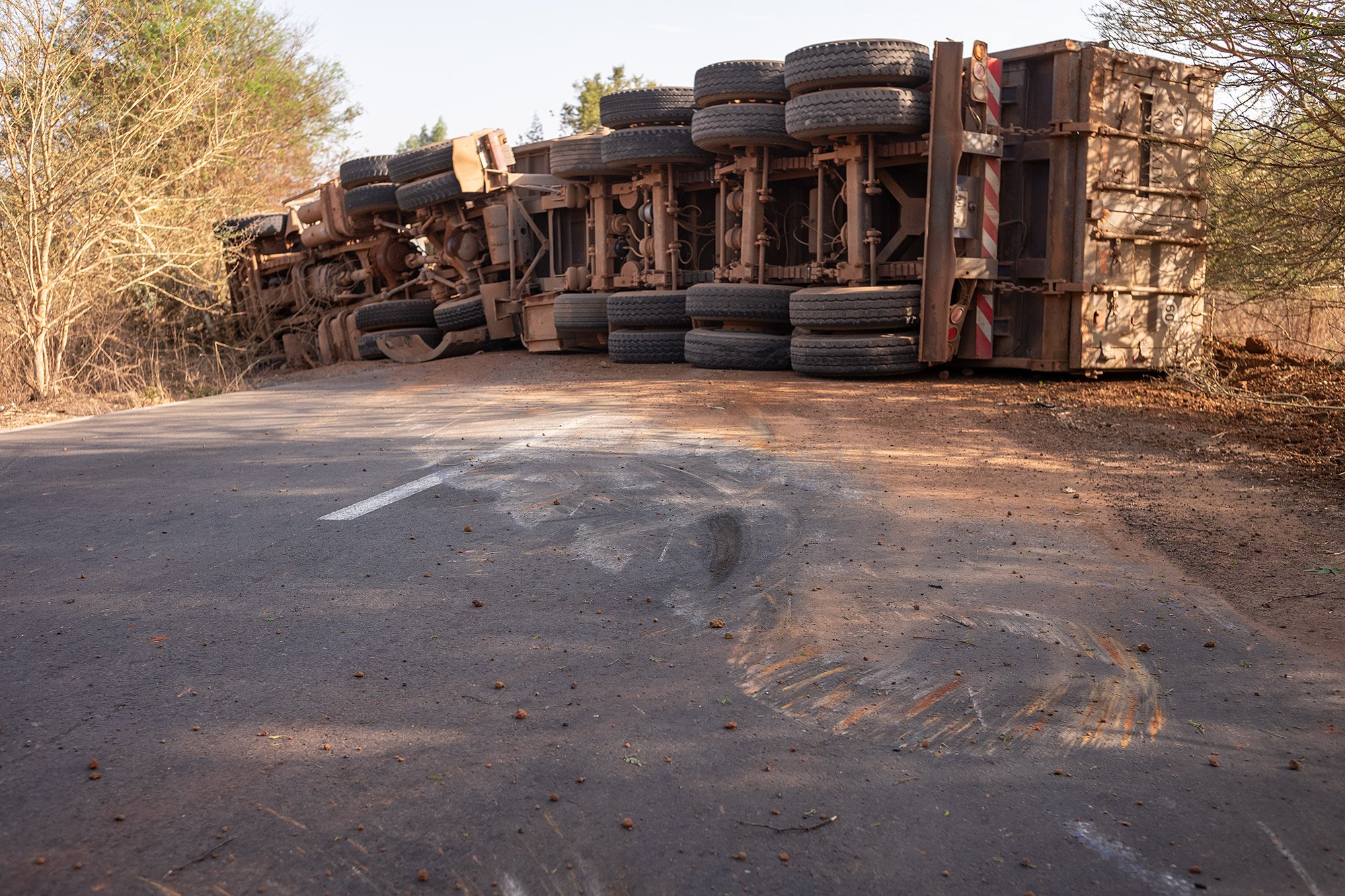
Traffic reroutes itself around the wreckage. Cars pick their way through the brush to one side of the road. Ibrahima tells me his uncle is a police officer in the region. He’s called him and we wait for him to arrive. A passenger comes over to me. Dommage, he says. Oui.
The gendarme appears surprisingly quickly. The army personnel stand at attention. The gendarme talks with Ibrahima then tells us we can go. We’ll meet up with Ibrahima’s uncle on our way back to Dakar.
•
At the border Ibrahima points me to a line and window. I’m then told to head into the building to a small room at the back of the building. People crowd the doorway. Finally, I’m shown into a room across the hall. Sallah greets me and sits me down across a desk from him. There’s music playing from a small radio and I bob my head to the beat. He sees me and tells me they’re having a New Year party at 8pm. He invites me to come dance.
He asks me how long I’ll be staying and is surprised at how little time I’ve alotted. I tell him I only have a long weekend. He tells me he’ll grant me a multi-year visa in hopes I’ll return. I tell him I’ll see if I can make the party. He tells me I am more than welcome.
Entering The Gambia, we are stopped by a group of children who block our path. One is dressed in festival attire and dances before our car. Ibrahima offers him some money and asks if I want to take his photo. He leans back in his seat to allow me to do so.
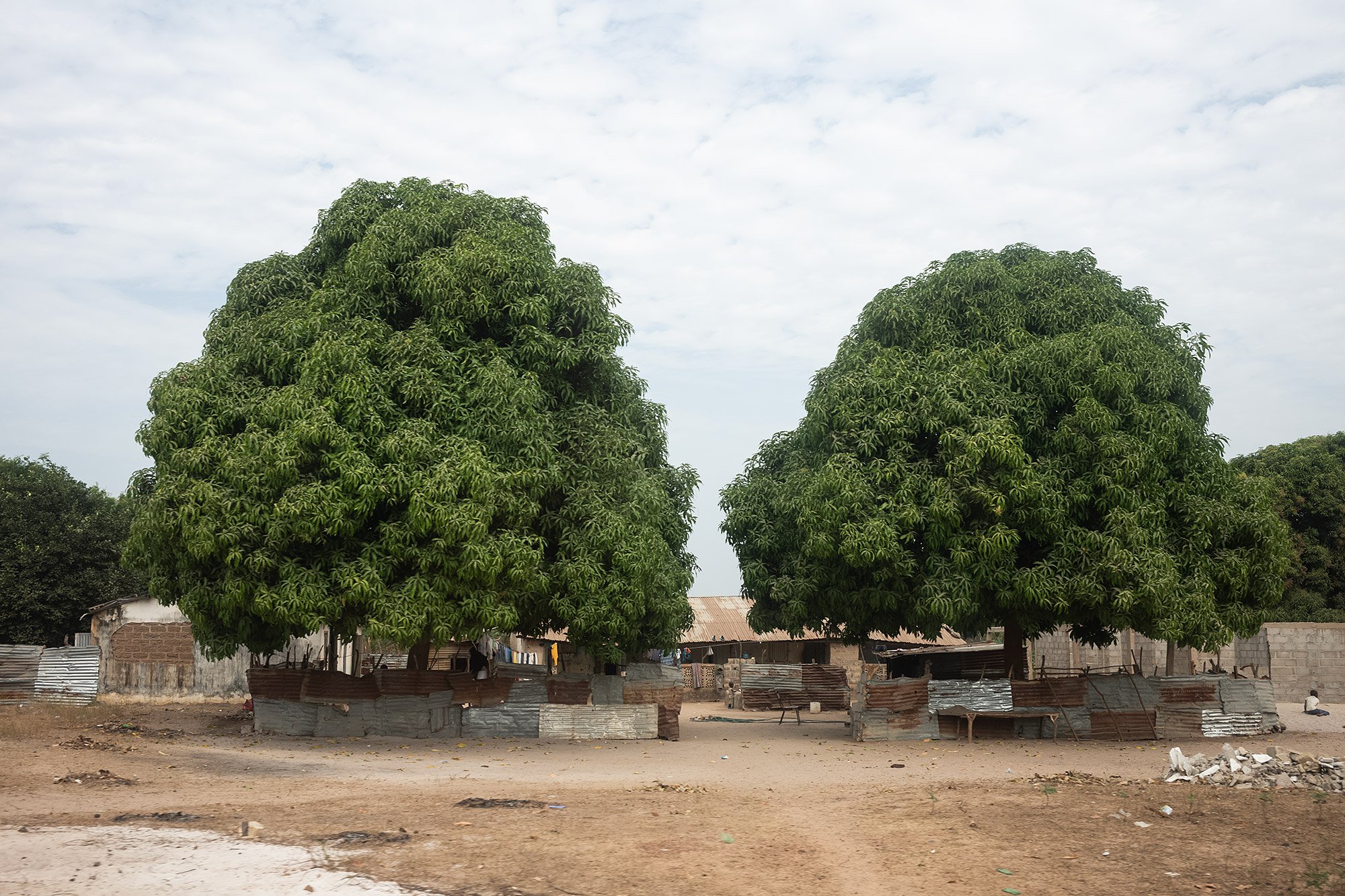
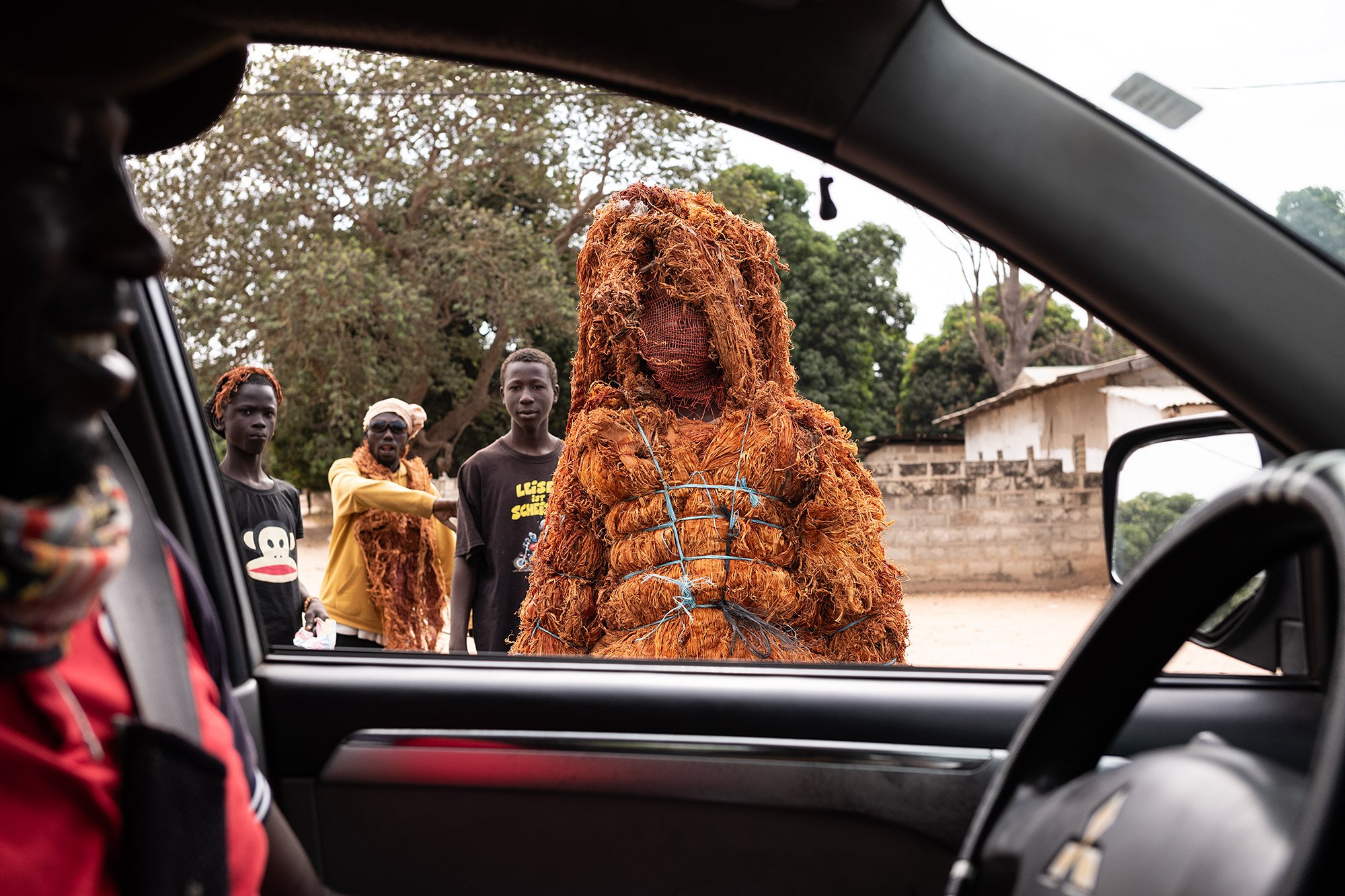

We pass multiple checkpoints and I see Ibrahima reach for loose bills in the dashboard of his car, handing them over on the sly. The Gambia and Senegal are scheduled to face off in the Africa Cup of Nations in a few days and he needles the soliders, cheering on a Senegalese triumph.
When we reach The Gambia River Ibrahima finds a spot to park his car, covering it to keep out the dust. He has me follow him to the ferry building where he buys tickets and then has us wait in a courtyard on the other side of the building along with groups of fellow passengers awaiting passage.
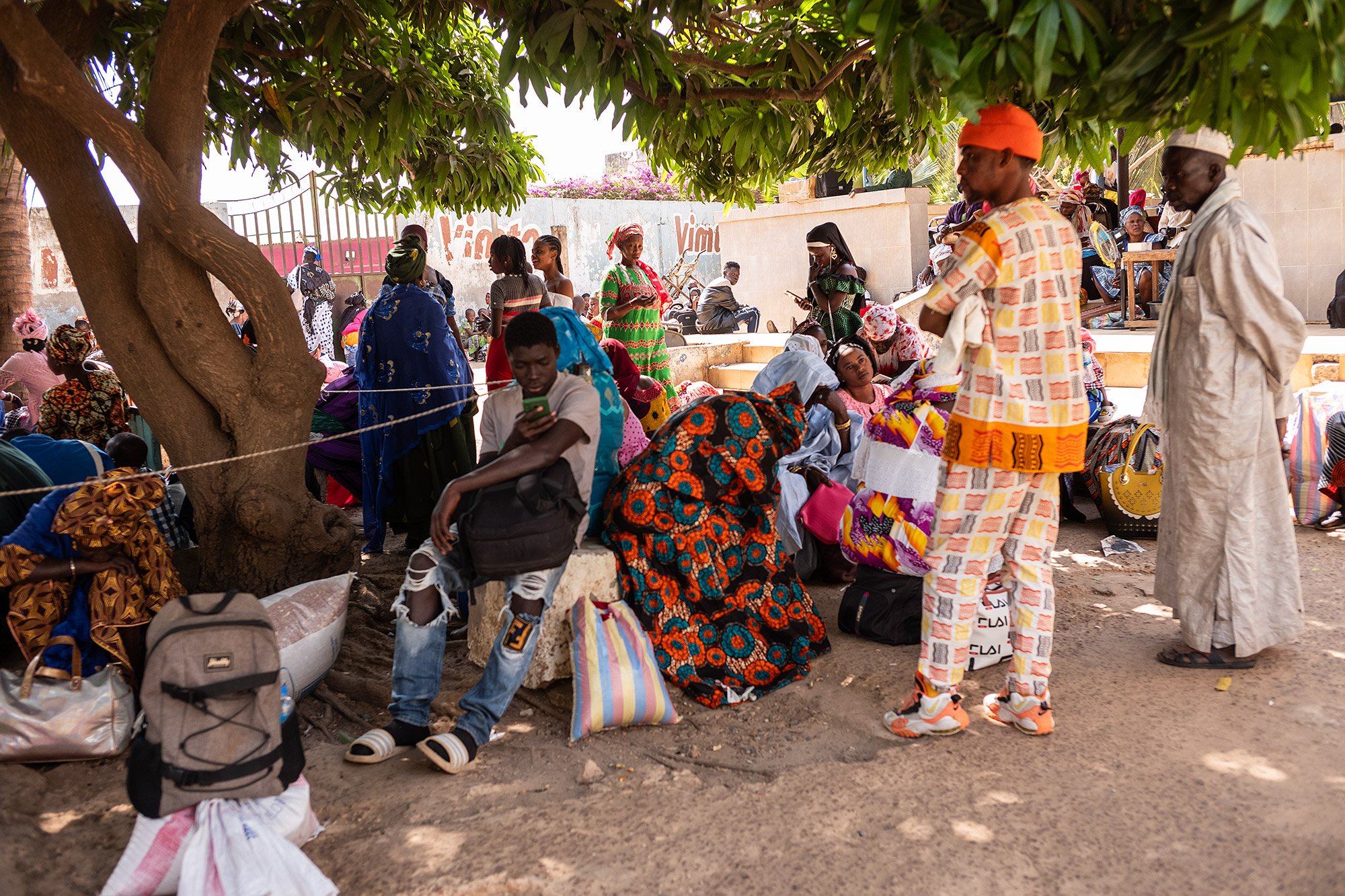
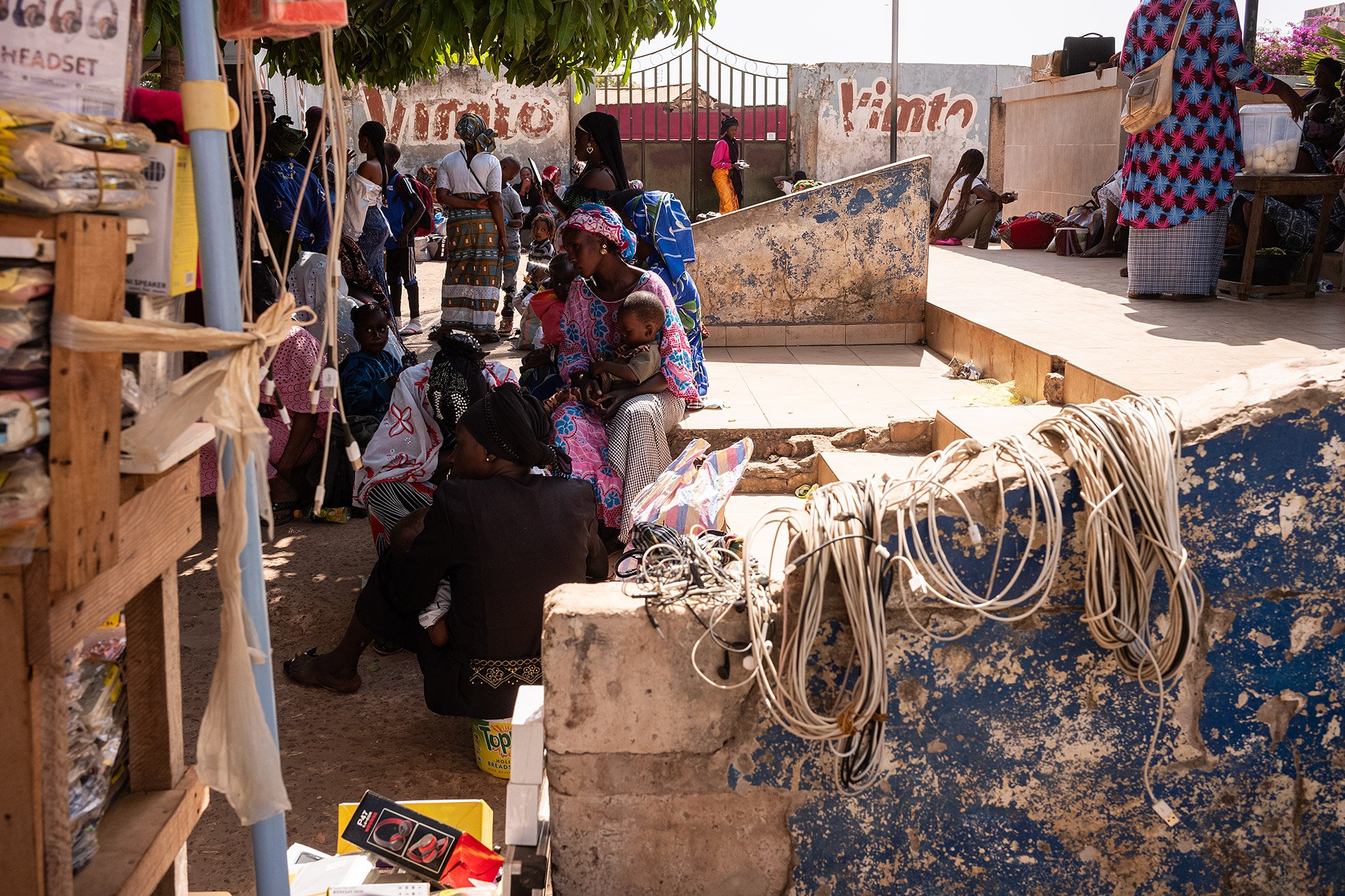
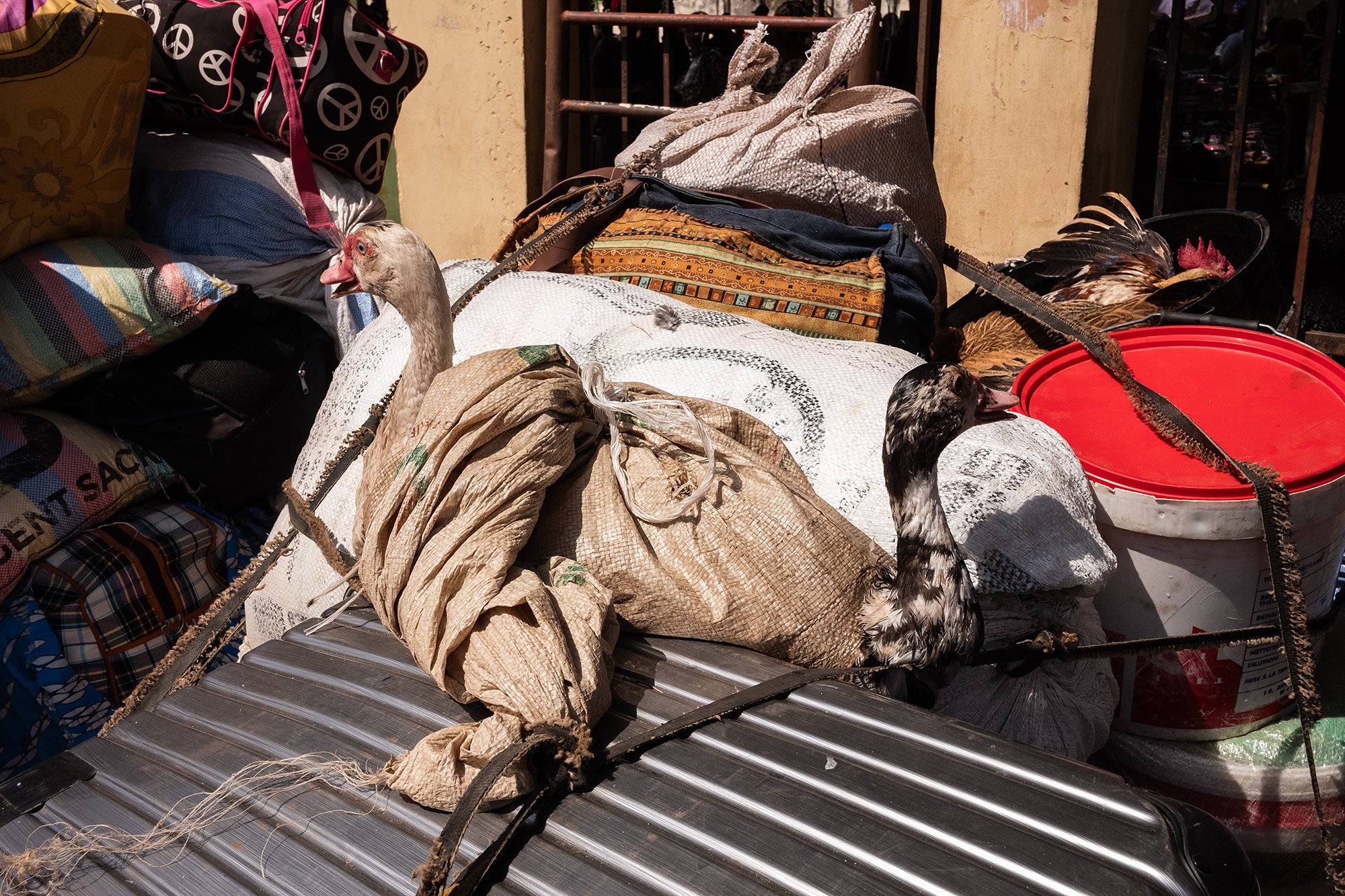

When the ferry from Banjul arrives Ibrahima(2) greets us. He brings us back around the ferry building and onto the road leading to the ferry. We hurry on board along with the masses of people who have been waiting, climbing to the top deck. Ibrahima(1) finds a spot in the front of the ferry. I find a spot in the shade and watch people arrive from Banjul in wooden boats.

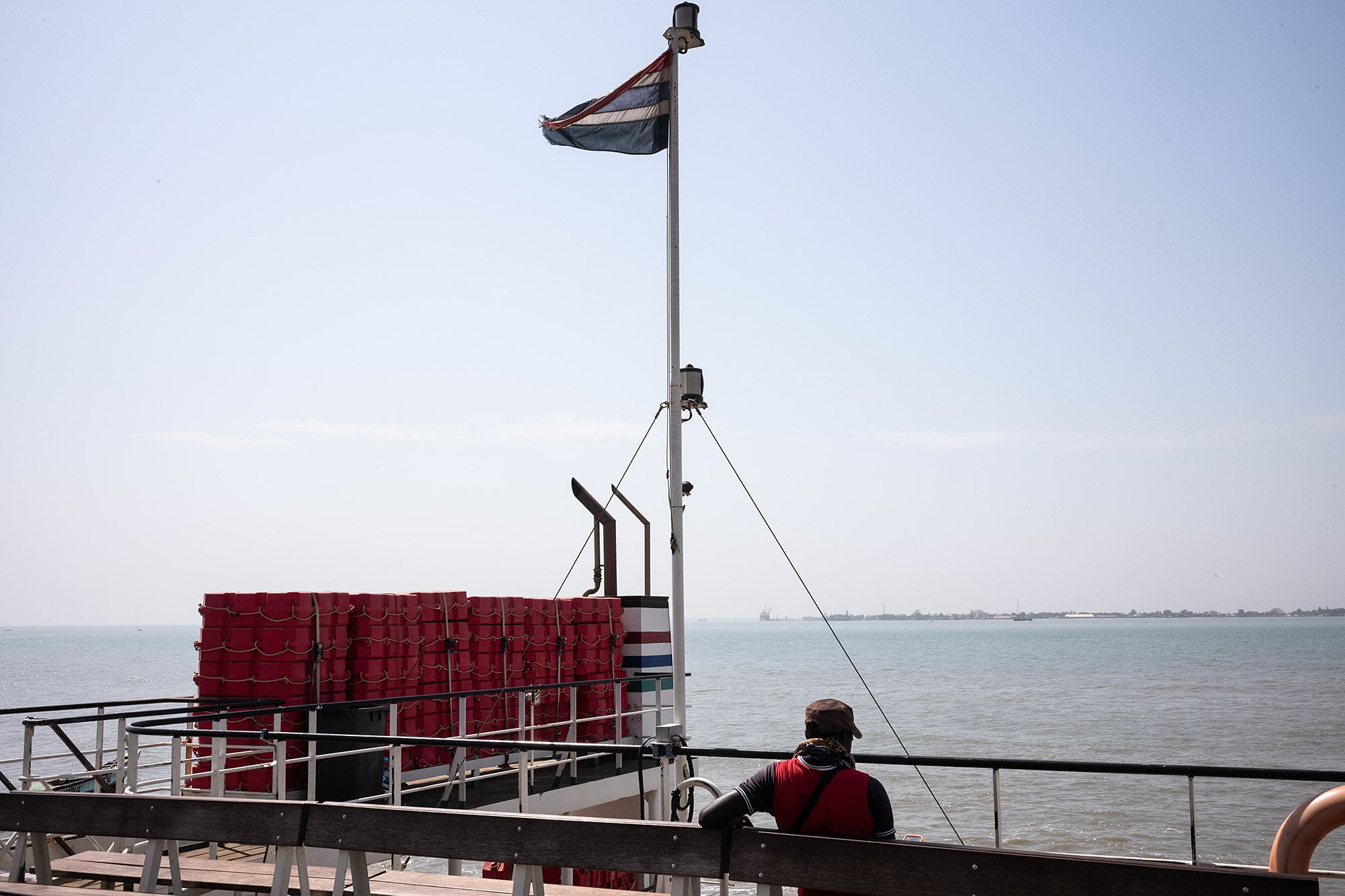
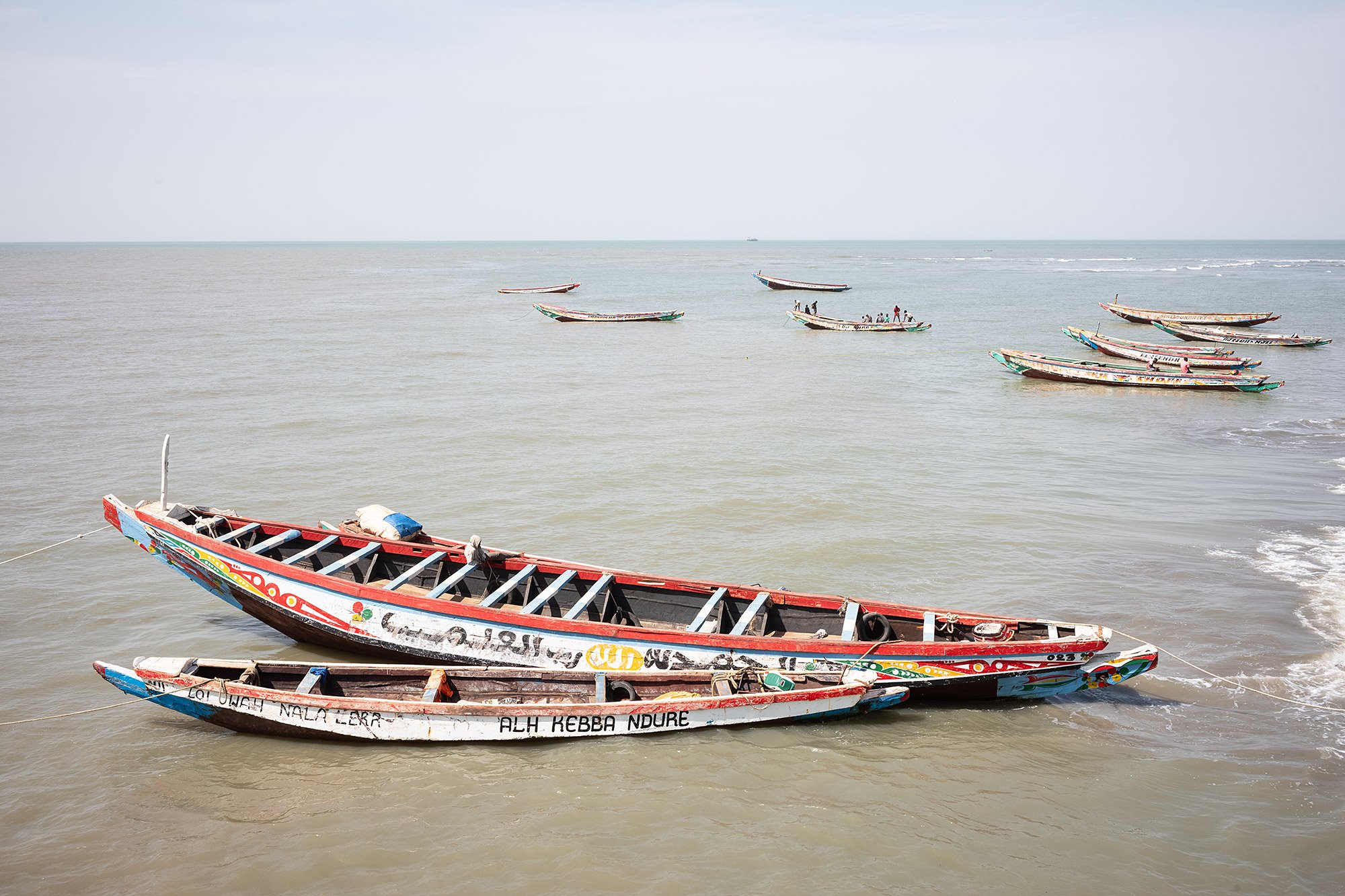
After some delay we are off. It’s 1800 meters from point to point, but it’s a slow ferry and it takes 40-45 minutes to make the crossing. It’s a pleasant journey; a steady breeze blows cooling air across the deck.
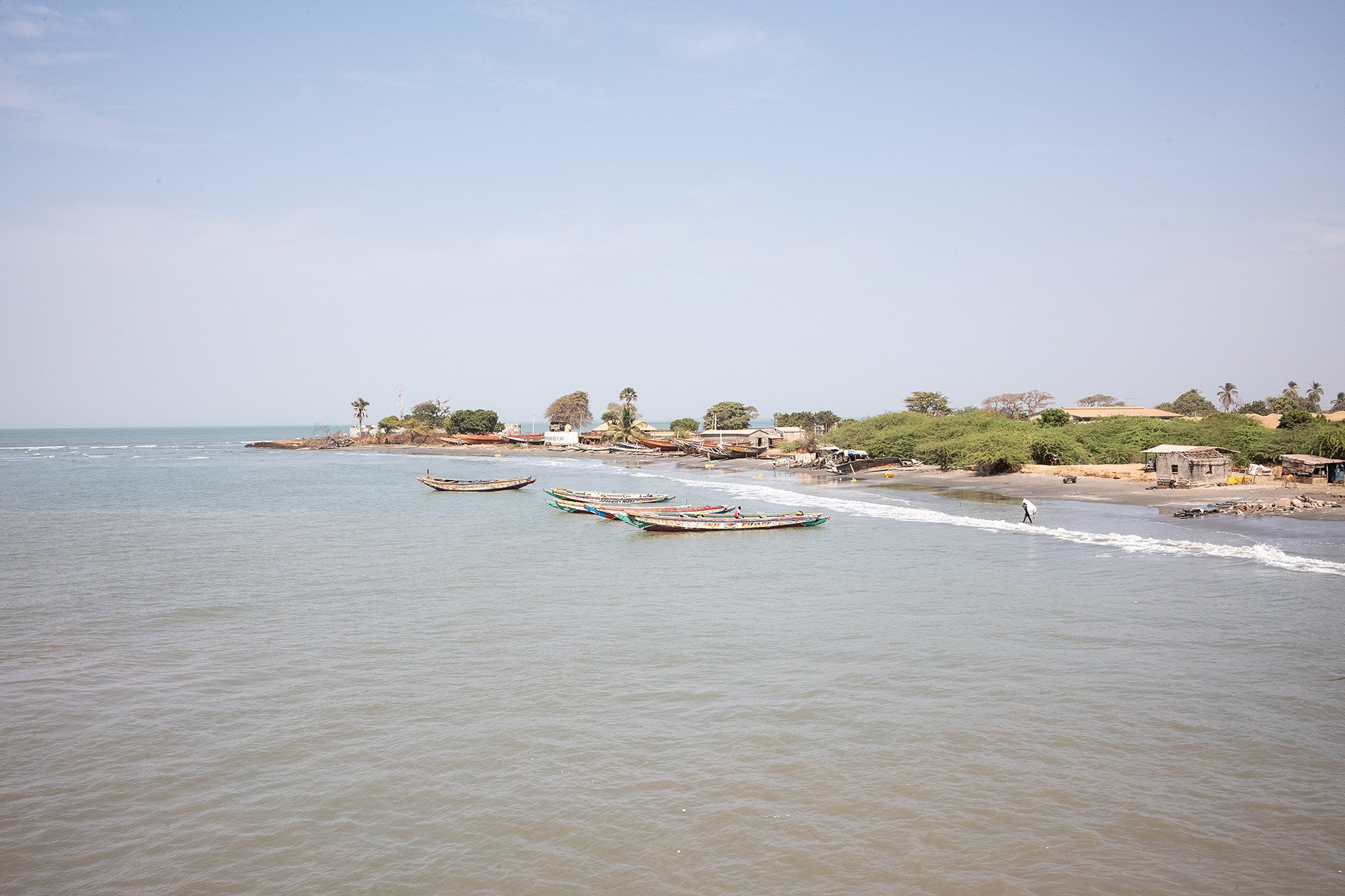
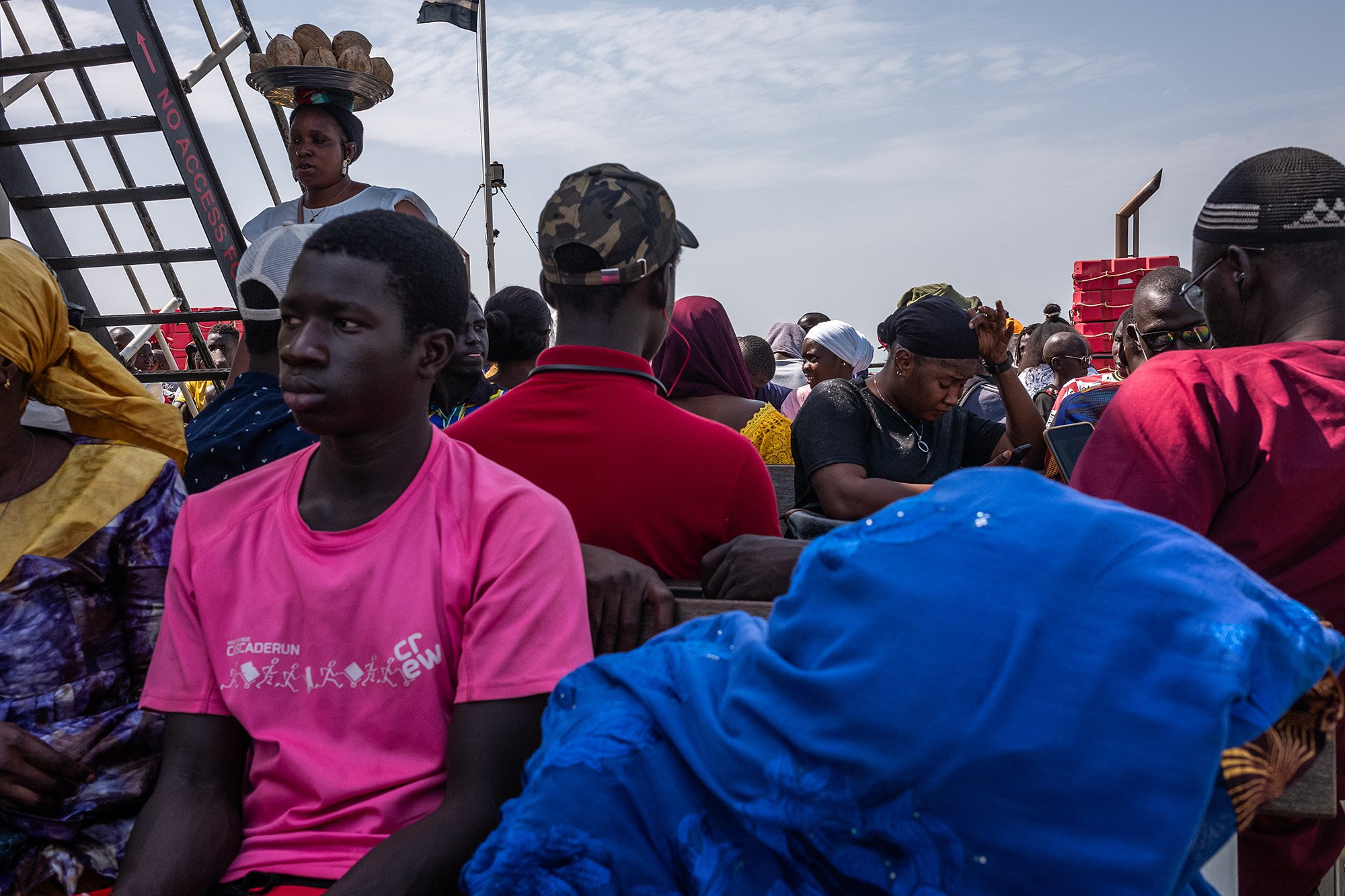
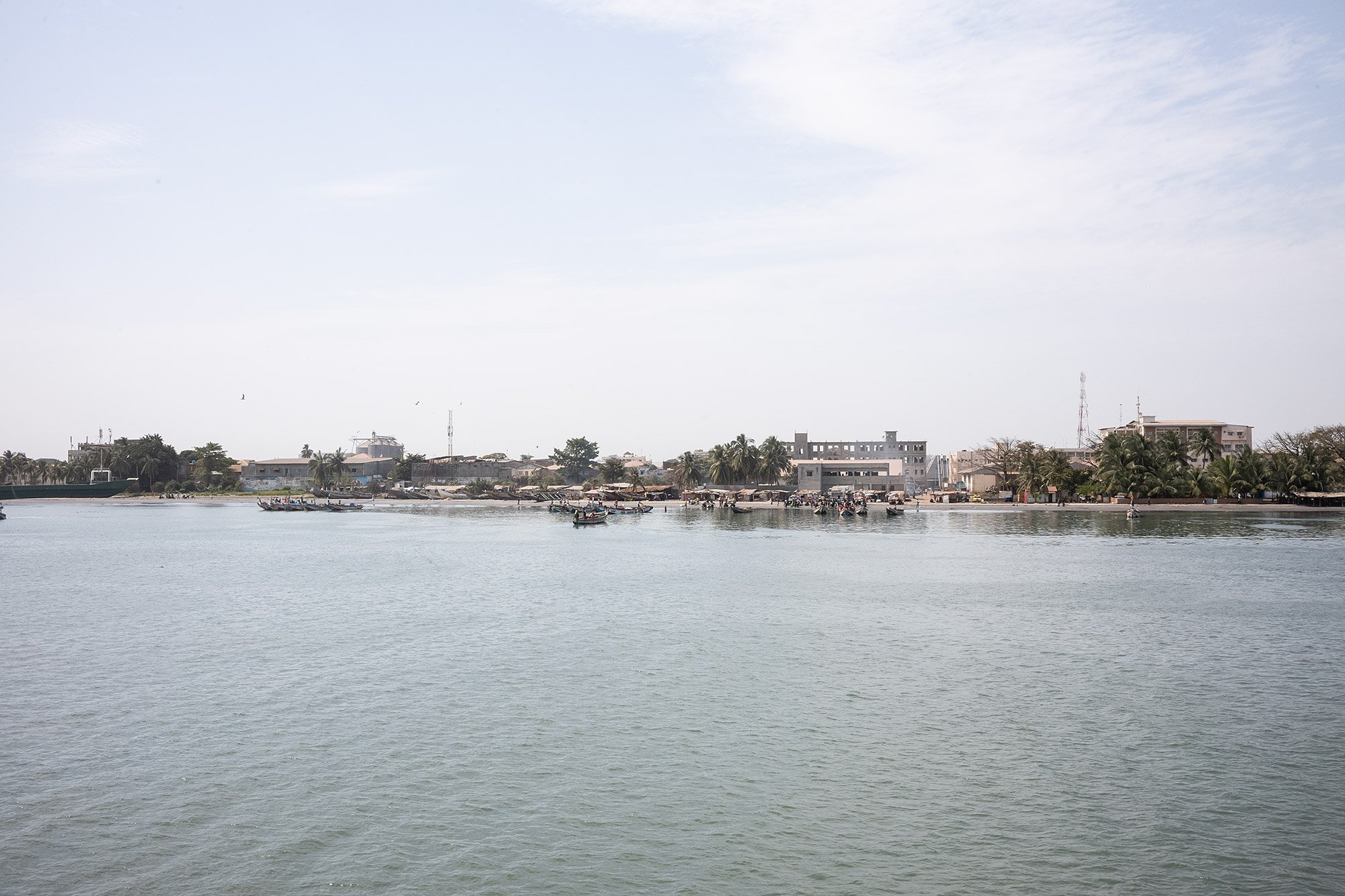
As we approach Banjul the passengers start shifting in preparation for disembarking. I get up along with Ibrahima(2) and move towards the front of the ship. After we dock the crowds file in a fairly orderly fashion down the stairs and off the ferry, threading their way between the cars disembarking at the same time. It’s a lot less chaotic than I had expected.
We move away from the crowds towards a main street where Ibrahima(2) has parked his car, an older Mercedes. He tells me he likes older cars; as long as the engine is good the car can go. He mistrusts newer cars with their reliance on electronics; there’s too many things that can go wrong and fixing them is a pain.


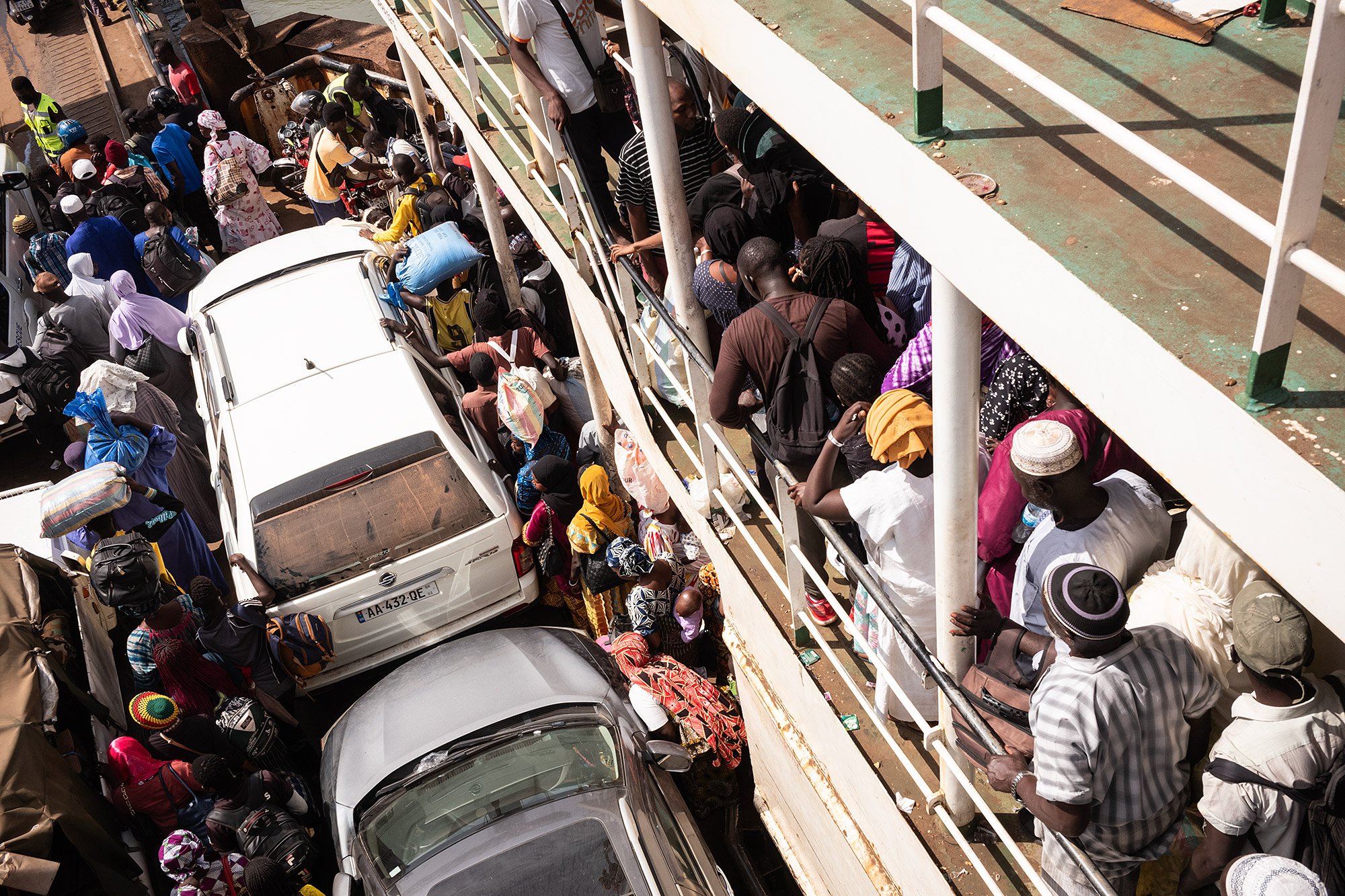
We drive away from the port towards the center of town. My tour of Banjul, the capital, has begun.
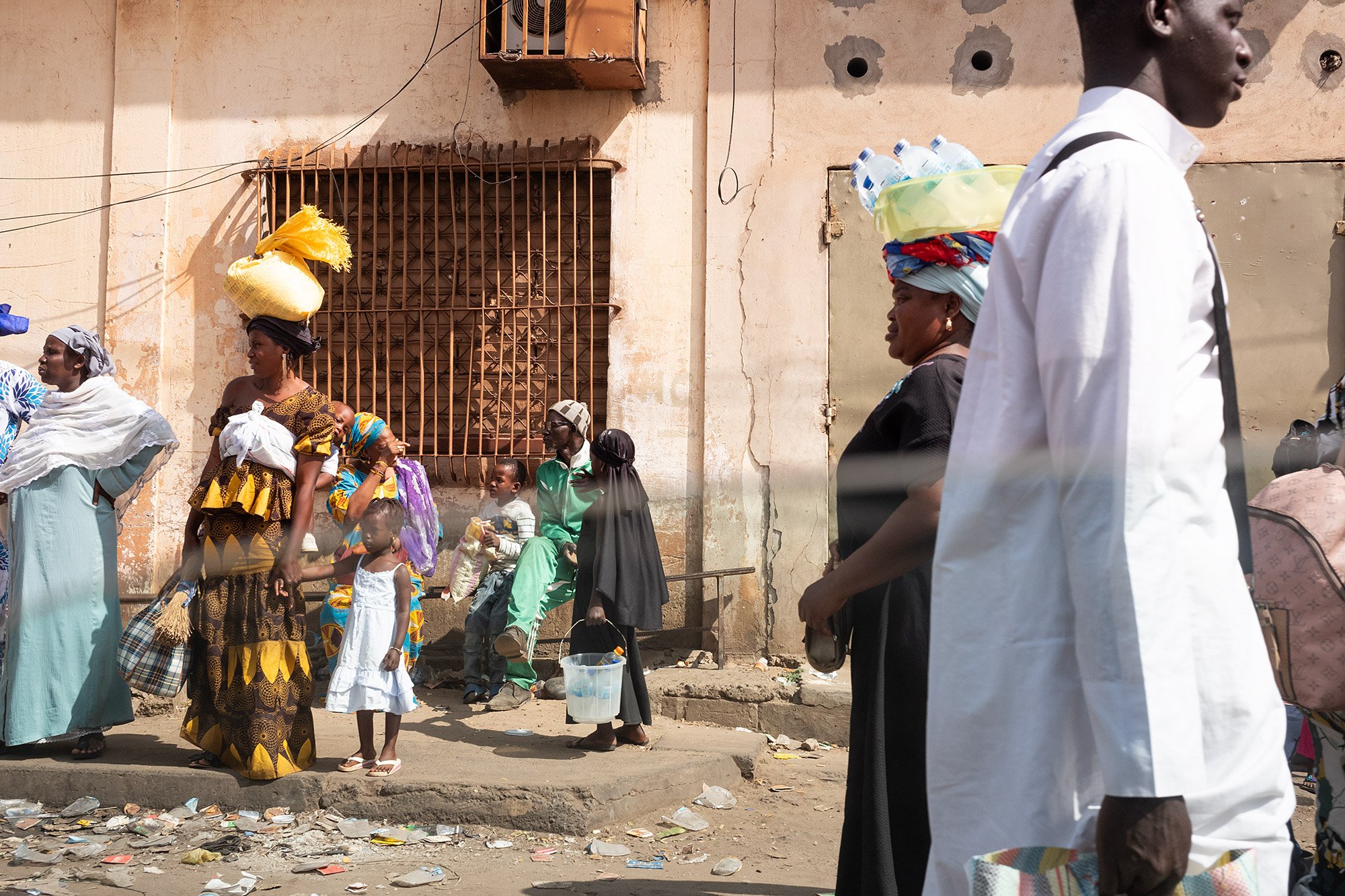
Our first stop is the National Museum. Ibrahima(2) puts Ibrahima(1) into a cab to his hotel. We’ll pick him up in the morning before taking the ferry back to Barra. At the museum Ibrahima(2) lets me wander through while he sorts our Ibrahima(1) and then walks me through the exhibits. In the courtyard sits a statue of a July 22nd soldier, once erected in front of the Arch 22, also erected to cmomemorate the 1994 July 22 coup d’etat that ushered in the dictatorship of Yahya Jammeh, though it has since re-maintained itself as a multi-party democratic republic.
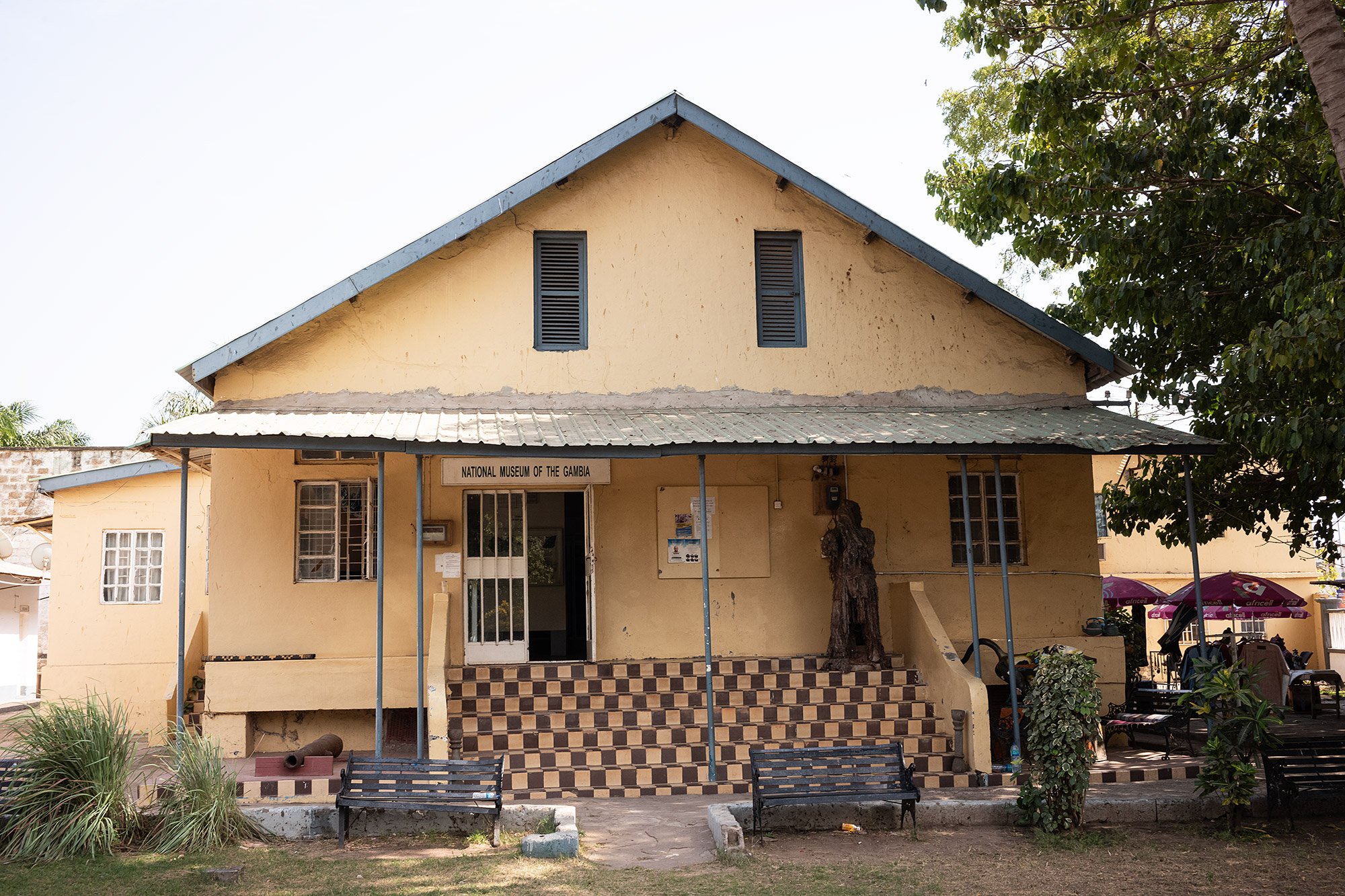

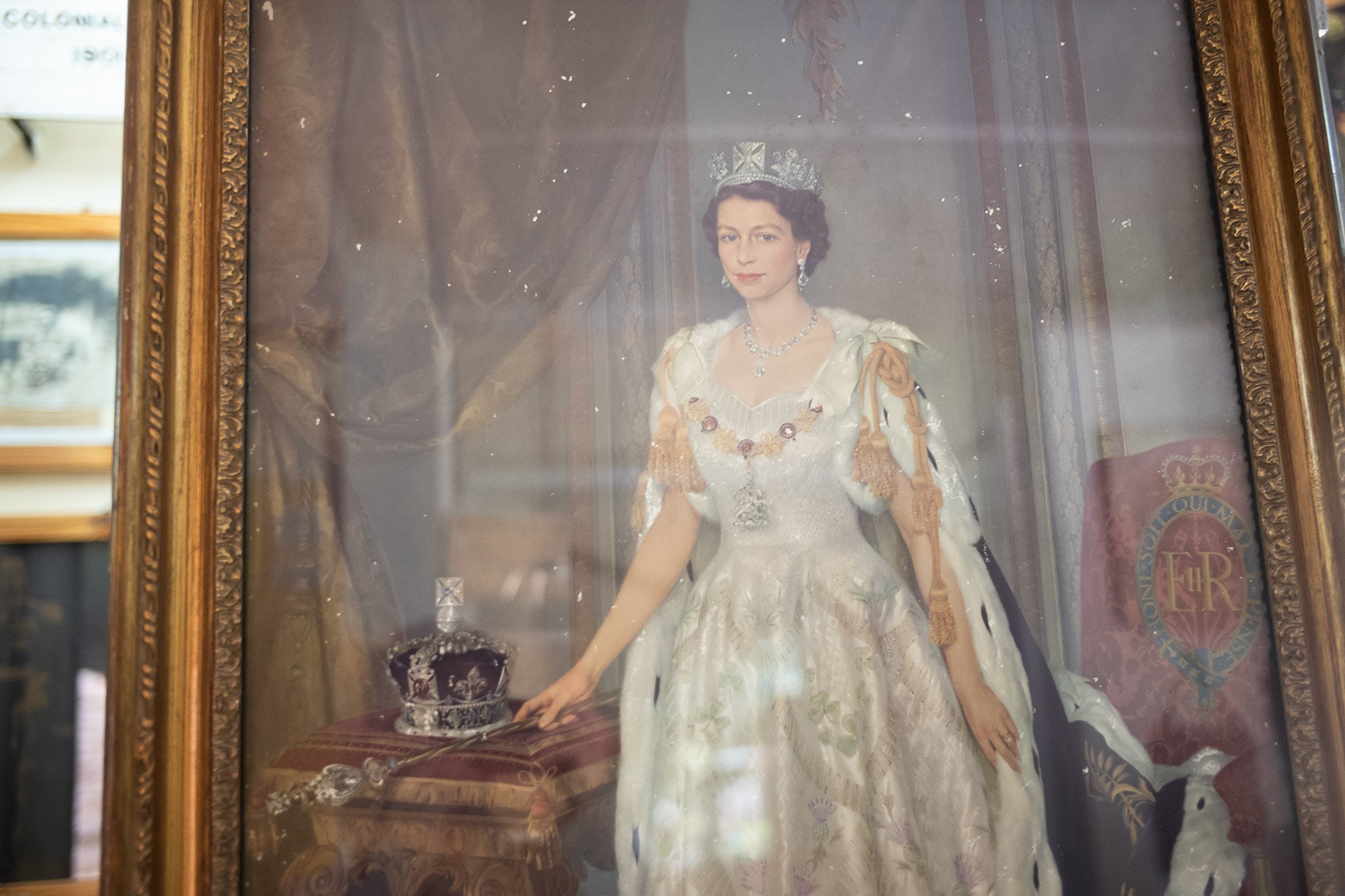
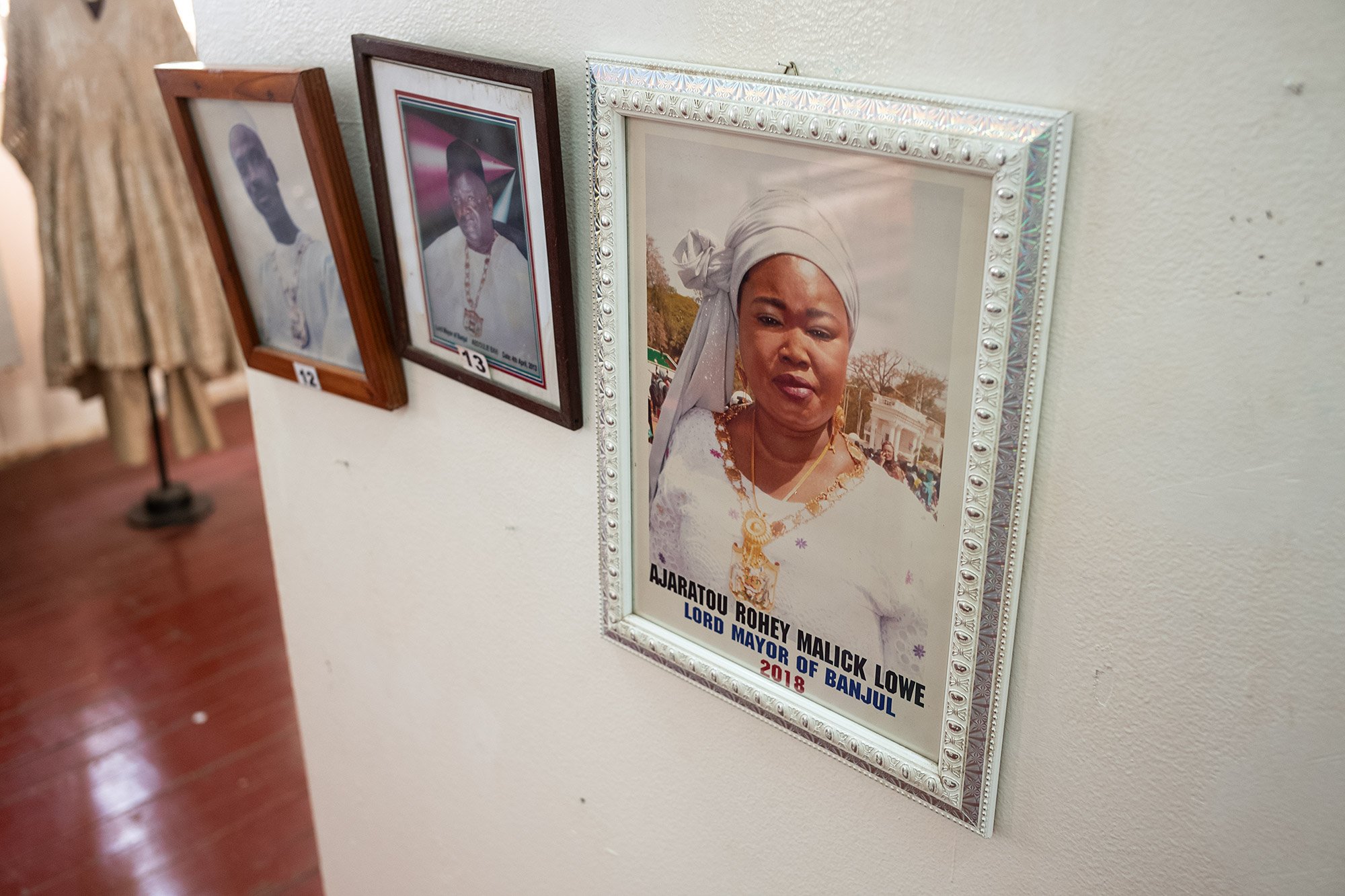

From the museum we drove through the city to the Arch, marking the gateway to Banjul. We parked the Mercedes in front of a set of bleachers in front of the arch and Ibrahima(2) led me inside and up the stairs for the views over Banjul out to the sea.

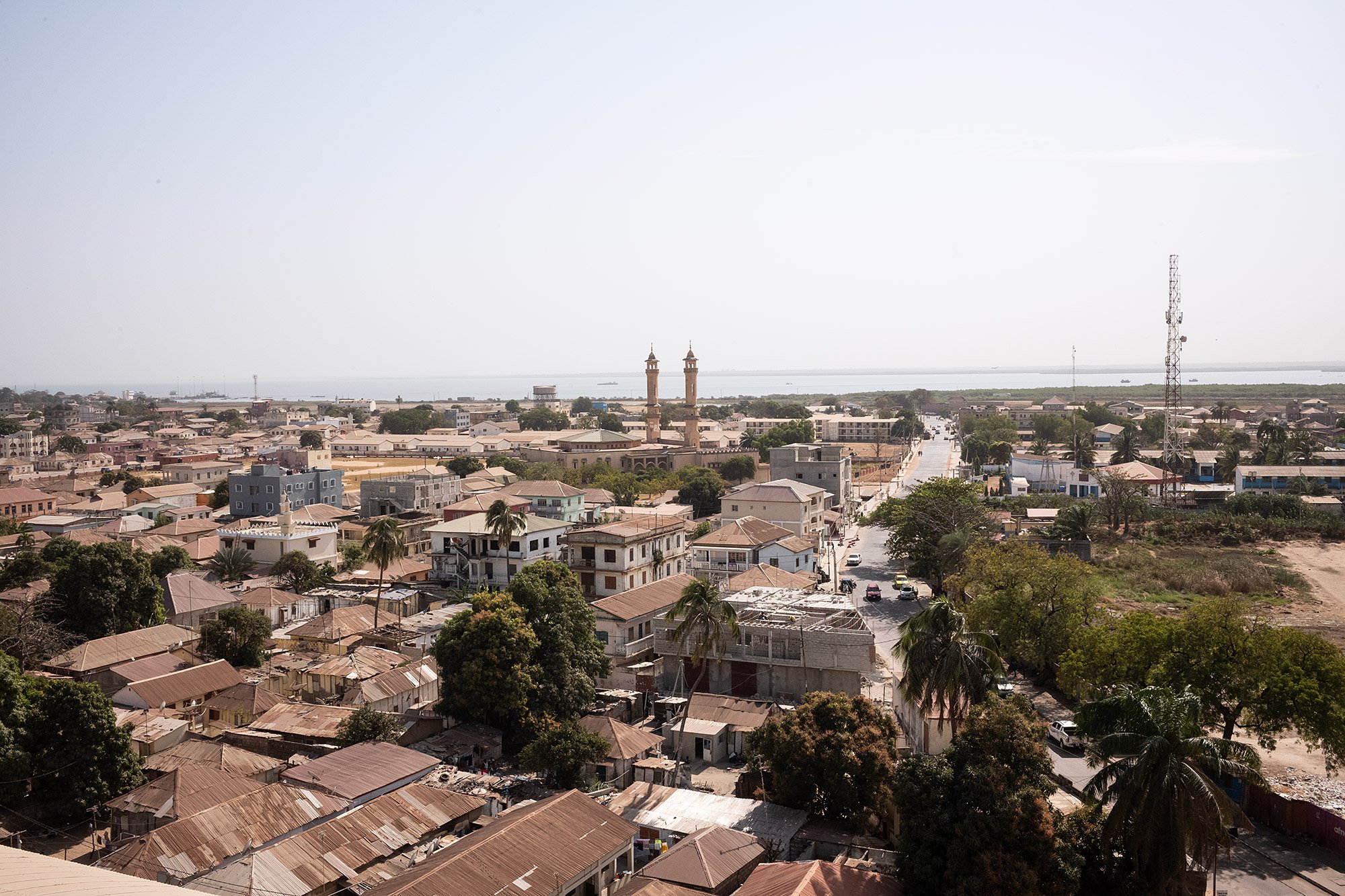
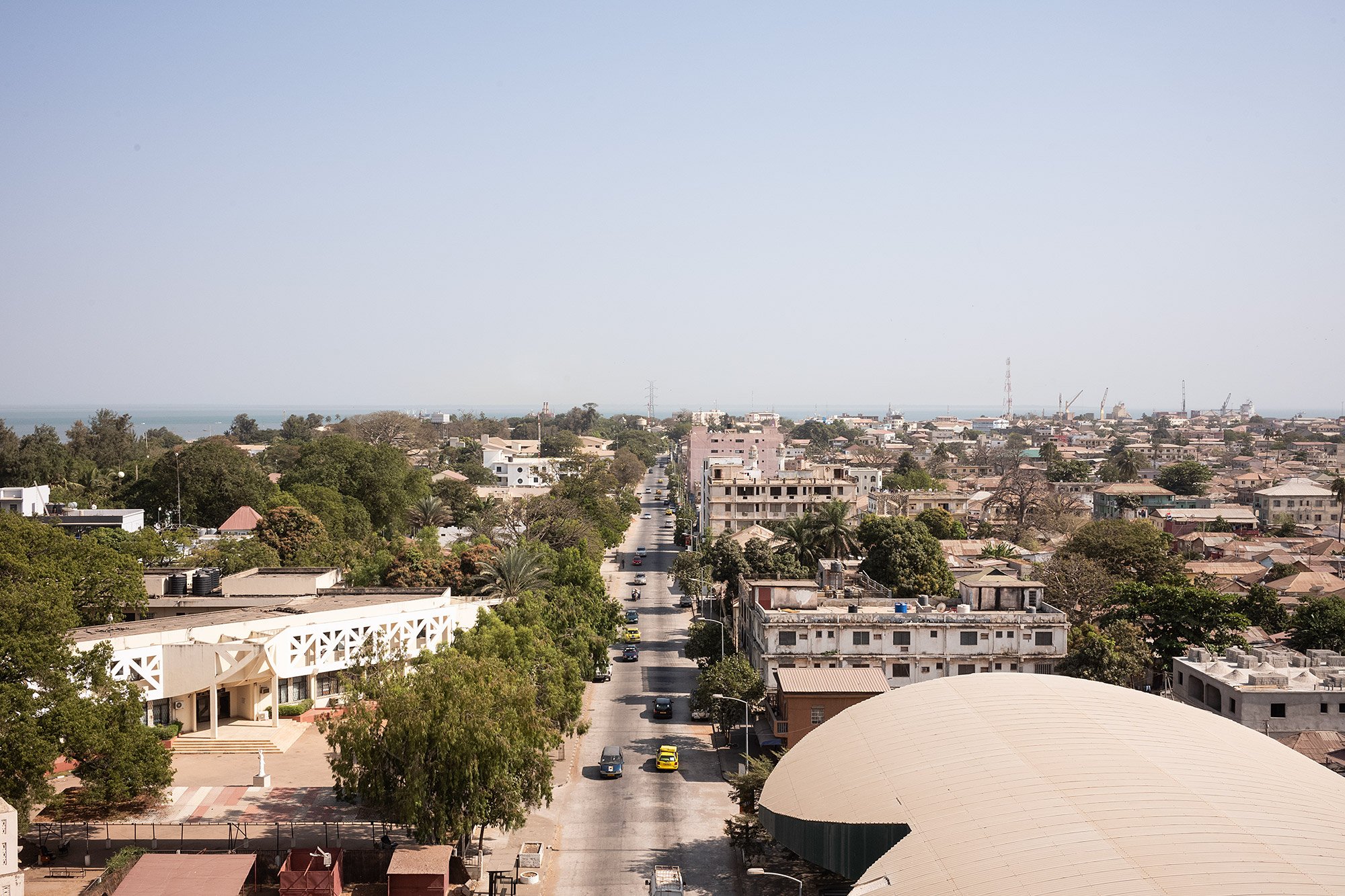
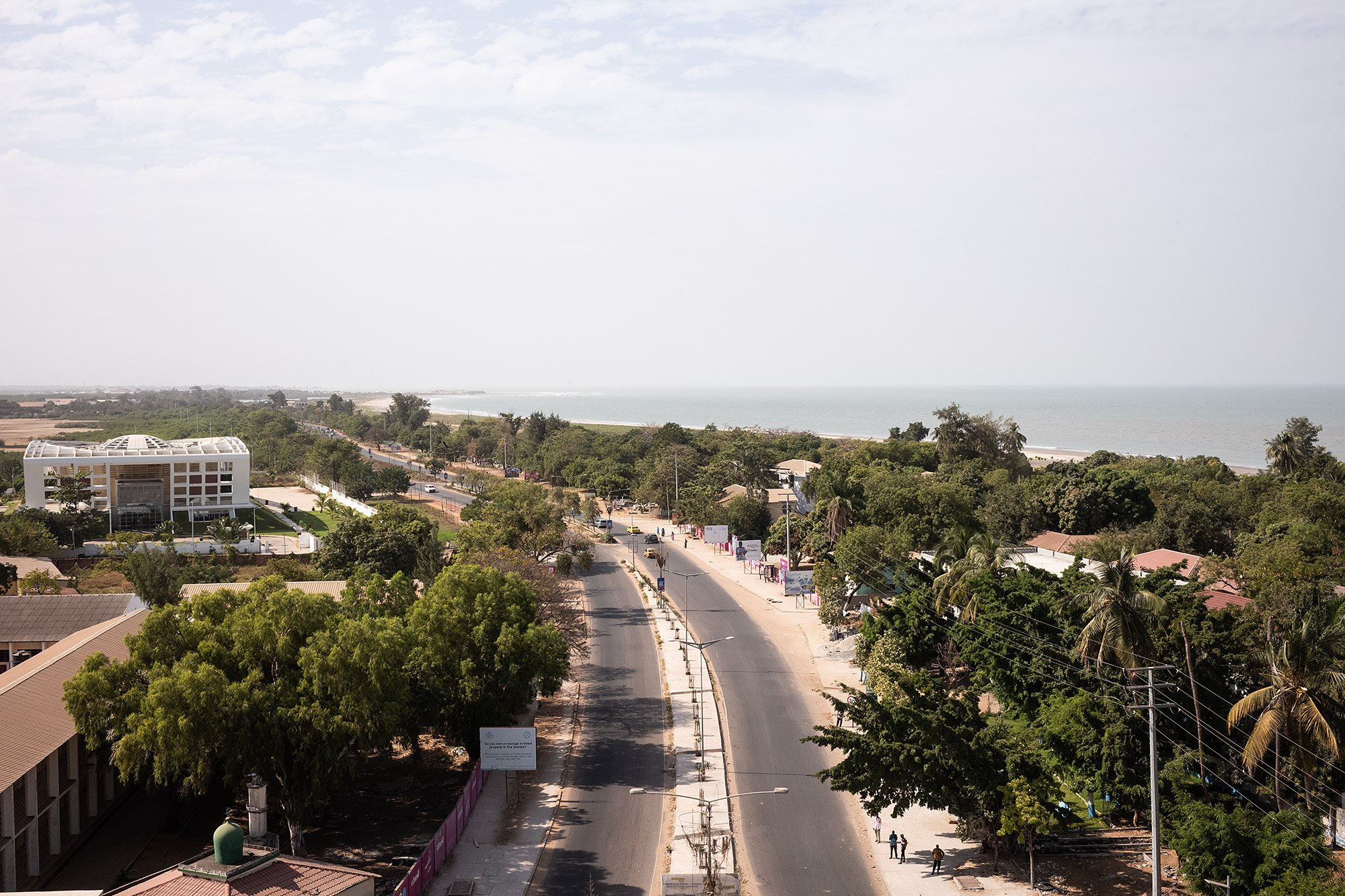
Inside the Arch a small museum exhibits photos of the disappeared under Yahya Jammeh’s rule and I linger over the photos and the captions underneath. Ibrahima(2) lets me take my time.
Back on the ground I take photos of the stands that have been erected by the Arch. Ibrahima tells me now they are used during festivals when it’s impossible to move through the city for the groups of people who gather here and along the parade route.
We get back into the car and drive past the arch towards the beaches in the south. Just past the arch he points out the Christian graveyard beisde the Muslim graveyard just beside.
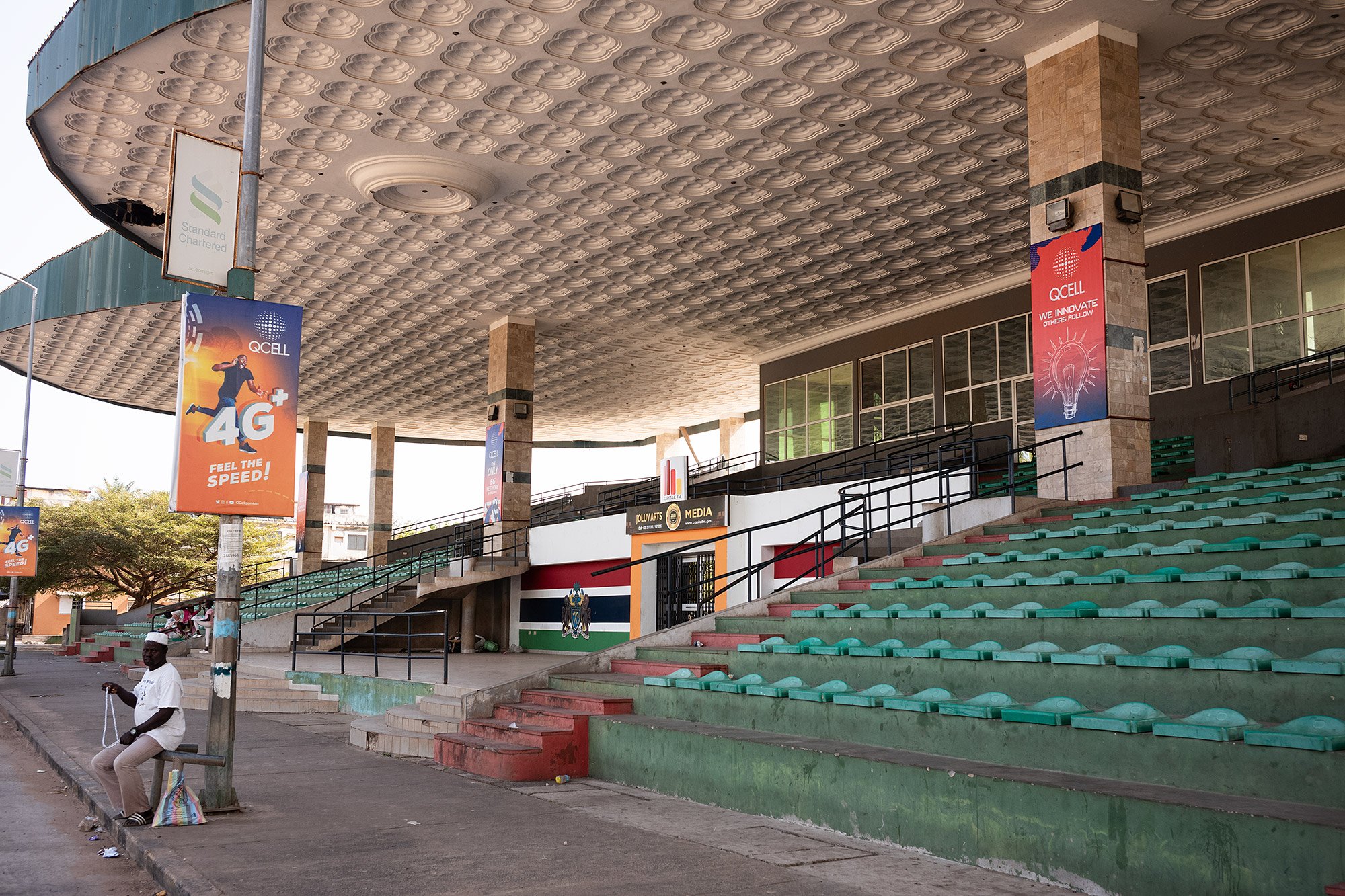
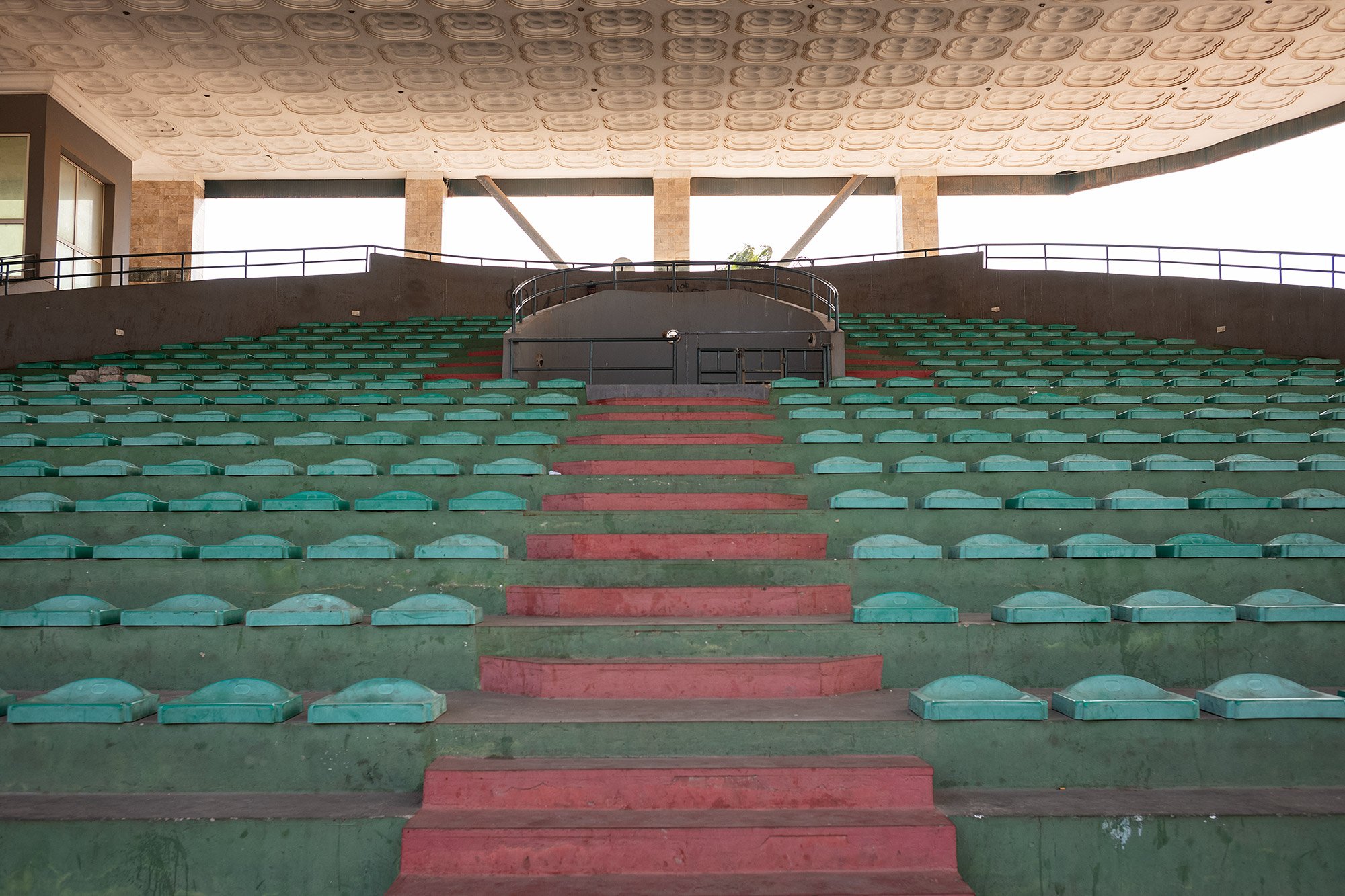
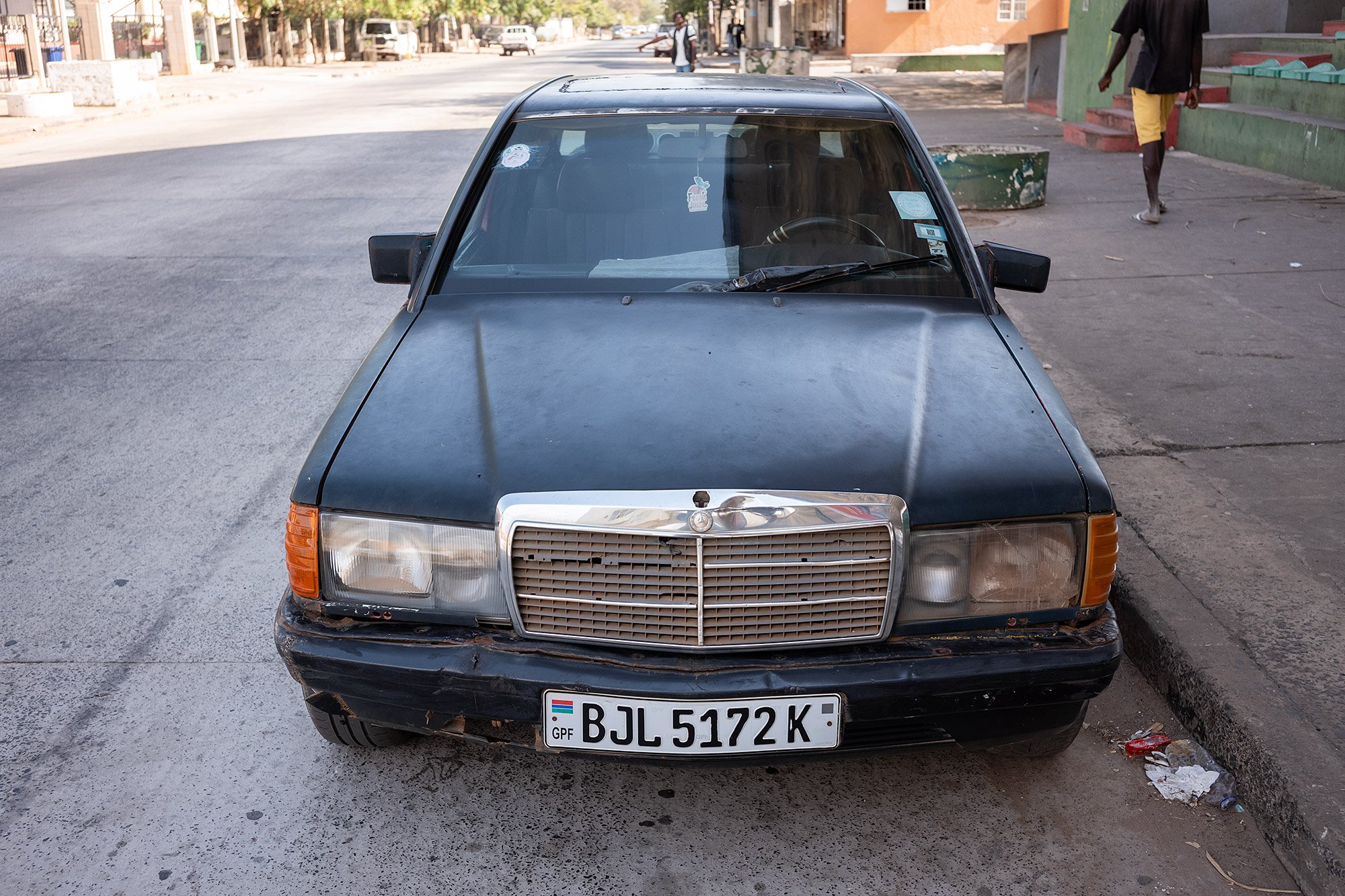
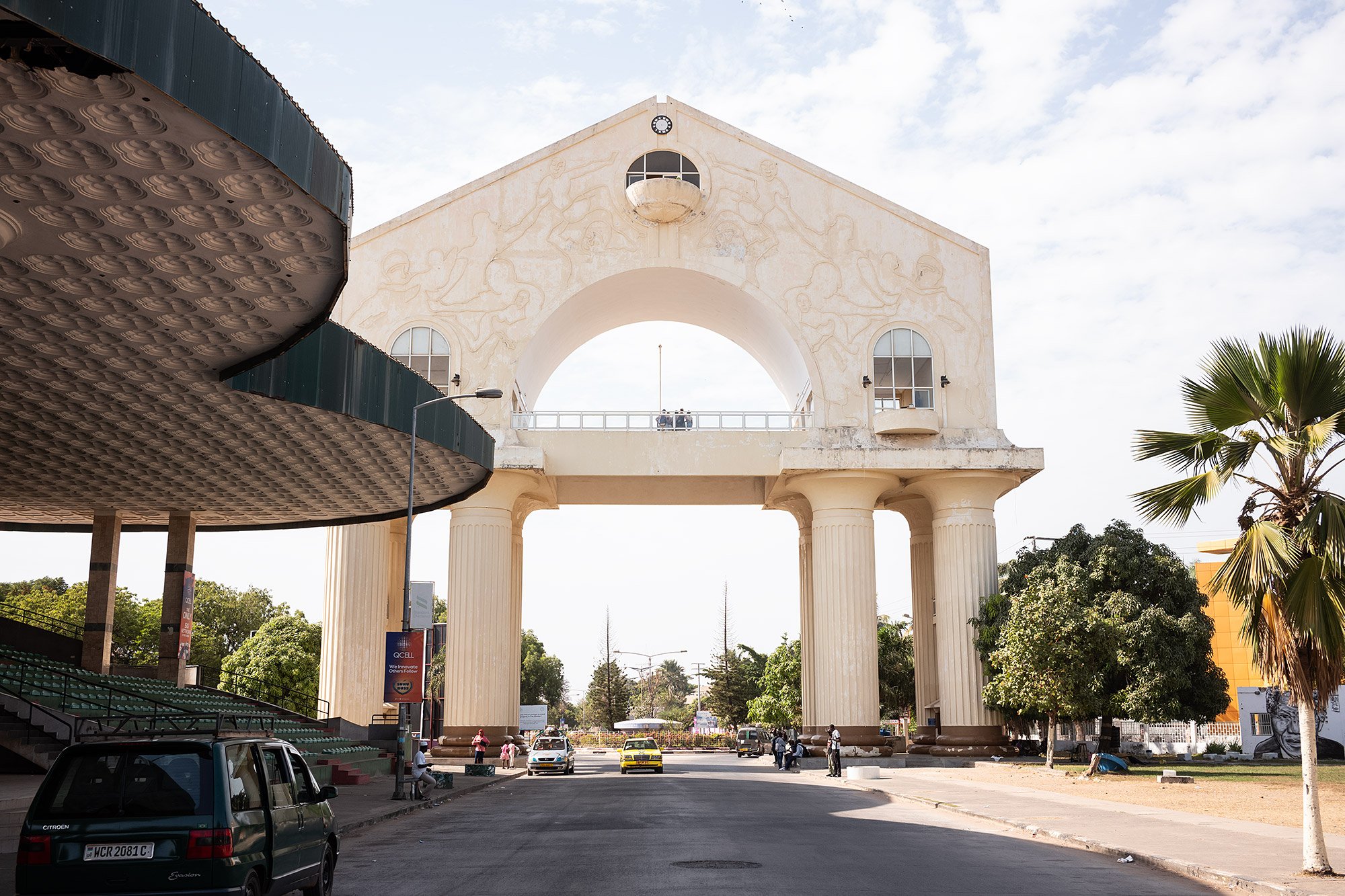
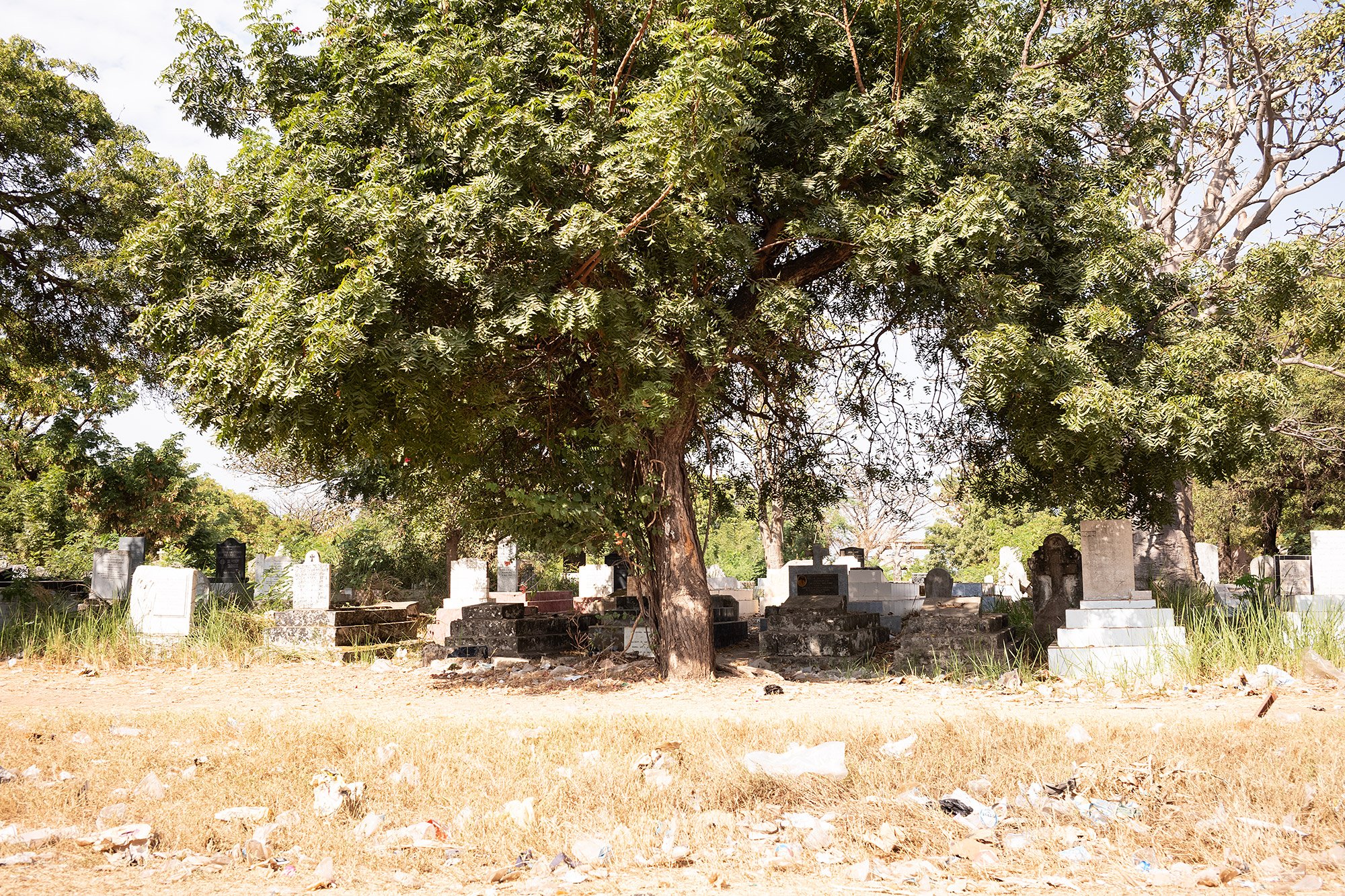
Ibrahima drives me to the crocodile pool, a privately run park home to a large number of crocodiles. The proprietor keeps them well fed and leads me through the grounds. The crocodiles lay docile before us as we step around them. He has me pet one by the walkway and I can feel it breathe as I lay my hand upon its skin.
At the end of our visit he leads me to a table to show me crocodile eggs that he’s collected. It’s surprising how small they are given how large the adults have grown.

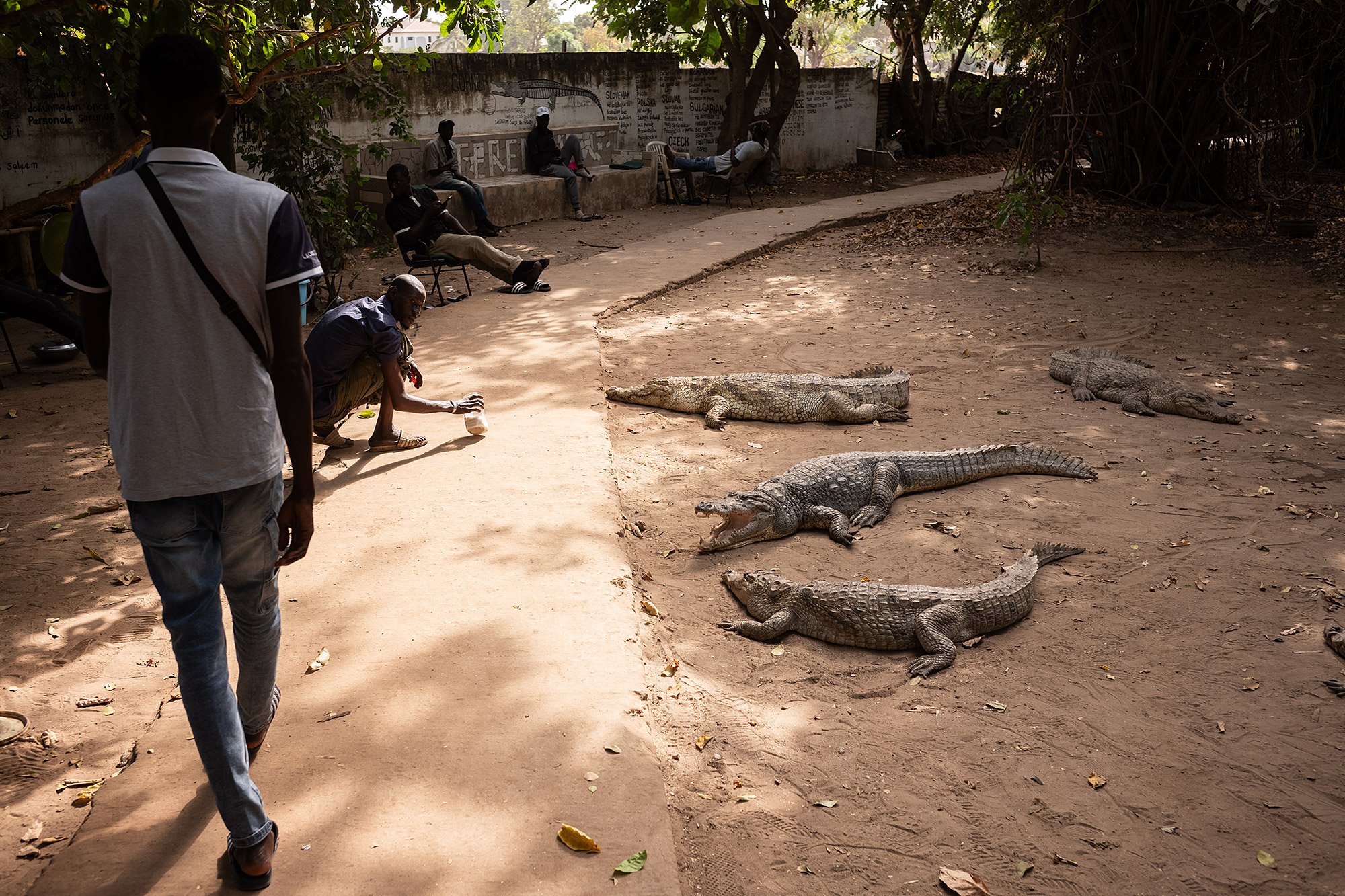
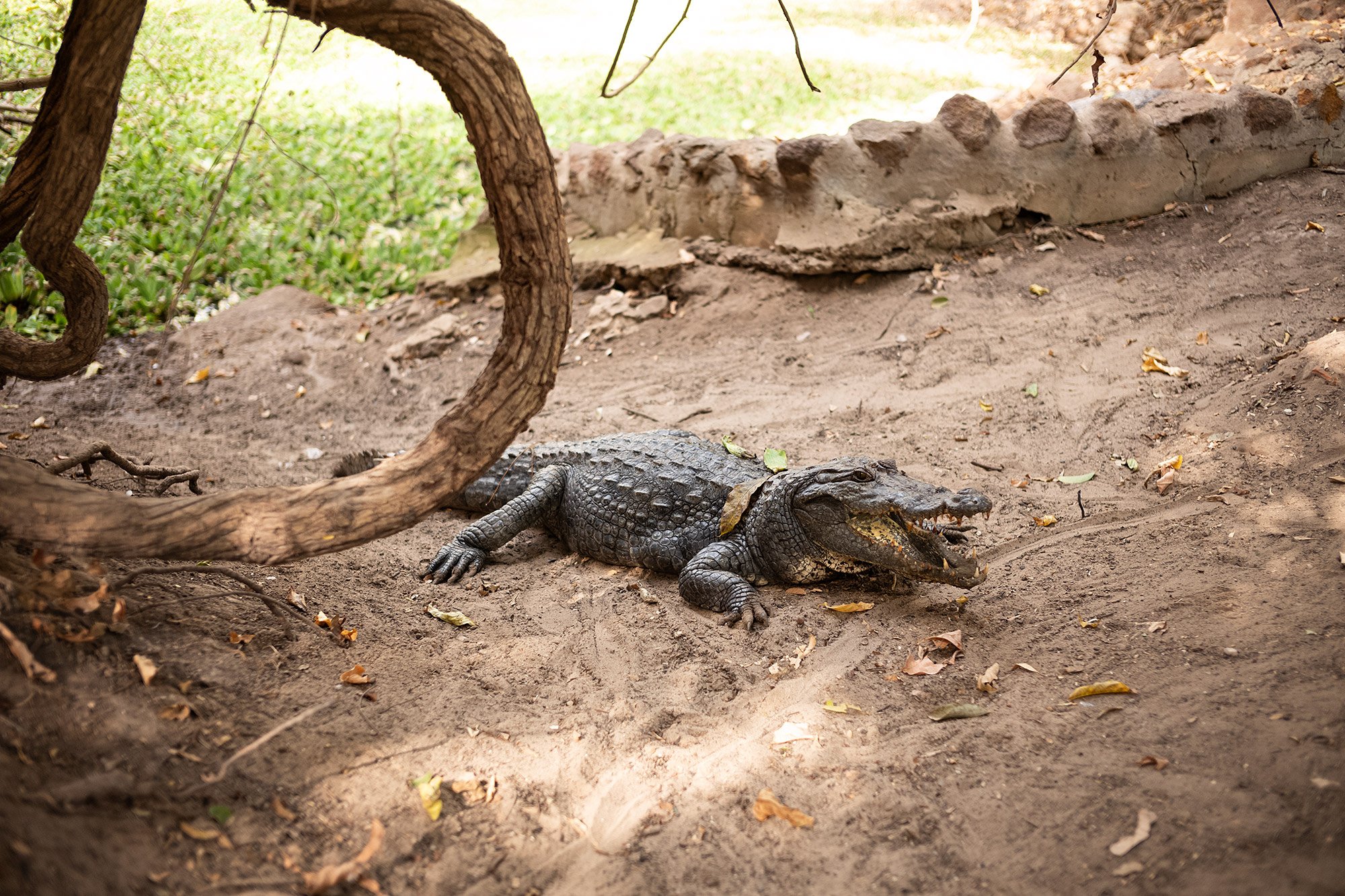
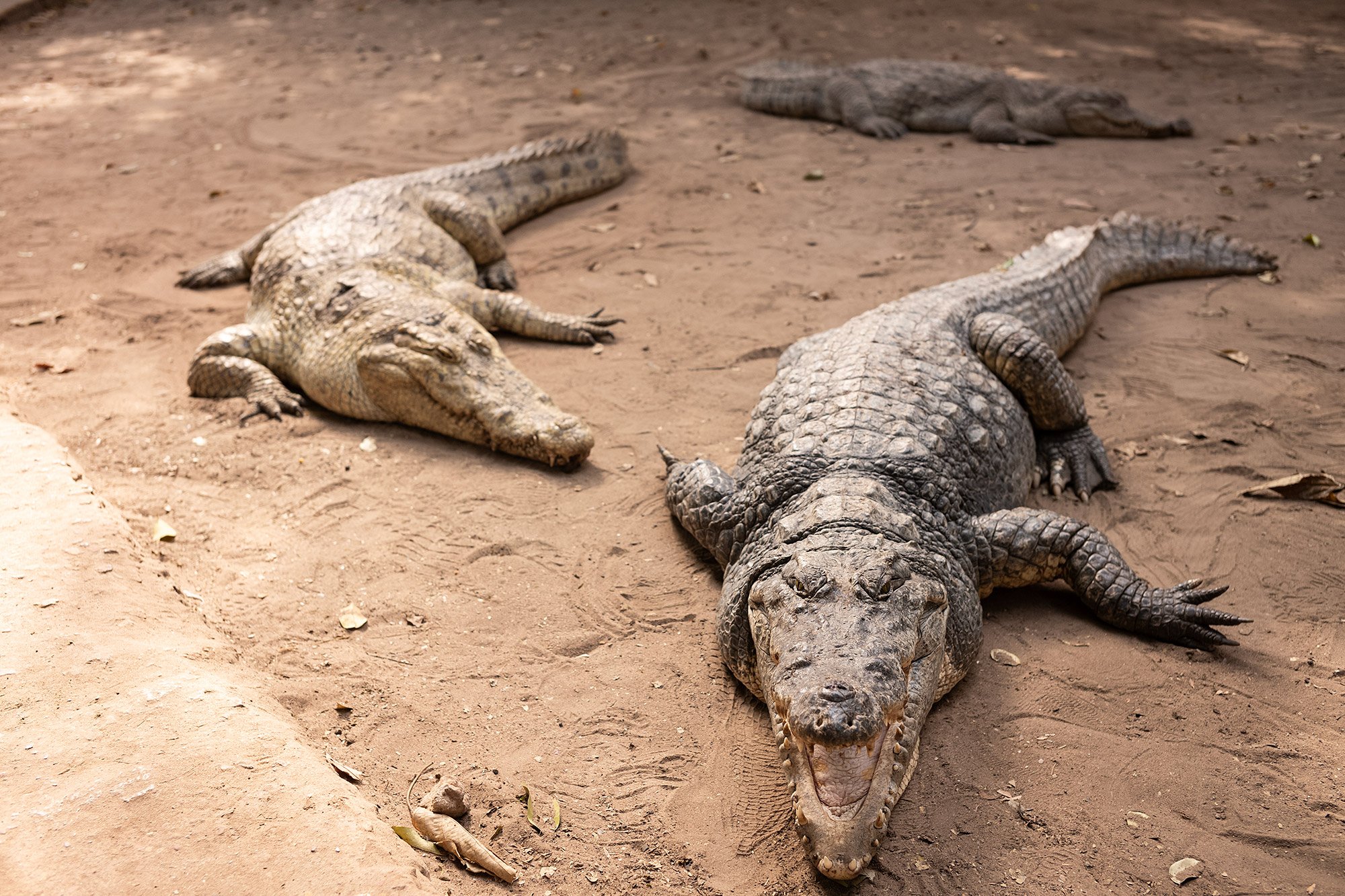
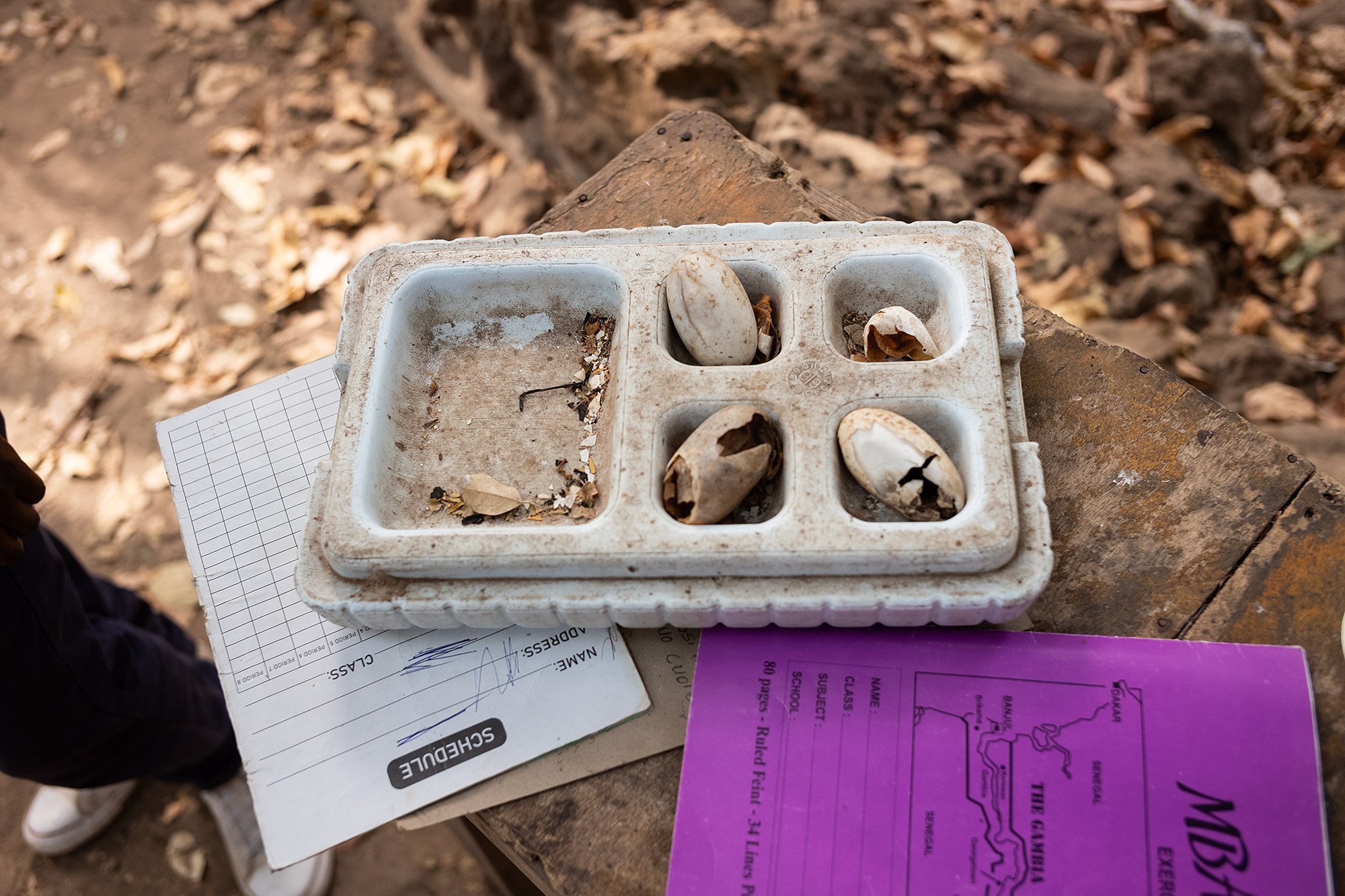
For lunch we stop at a modern-looking mall to eat in the food court. We’ve been driving along a wide highway in the process of being redone. It leads from the center of town all the way to the airport. A number of Chinese restaurants line the route.
Ibrahima(2) leads me to a restaurant called Taste of Africa and hands me a menu. I decide to order the local fish with cassava and beans. Are you sure, he asks. I don’t know if you’re going to like it. I assure him it’s what I want and he places the order. The cashier hands us a number affixed to a stand and we find a table.
The food is good and plentiful. A spicy sauce has been given to me on the side and it enlivens the cassava and beans. I finish the fish but cannot finish the sides and ask to have it to go.
During lunch we talk about social media and virtual reality and the future. Ibrahima(2) is not a fan. Already no one is talking at the dinner table, he says, everyone on their phones. Virtual reality will only make it worse.
We talk movies and TV shows and recommends a show I hadn’t heard of starting Michelle Yeoh on Netflix along with another crime drama. I take photos of his iPhone screen so I can look them up later.
After lunch we get back in the car and drive to the Bijilo Forest Park to visit the monkeys. Ibrahima(2) buys a bunch of bananas and leads me on the nature trail into the park. He tells me that the monkeys aren’t kept to the park and are allowed to wander freely in and out of its confines. He tells me he’s certain we’ll see them, however.
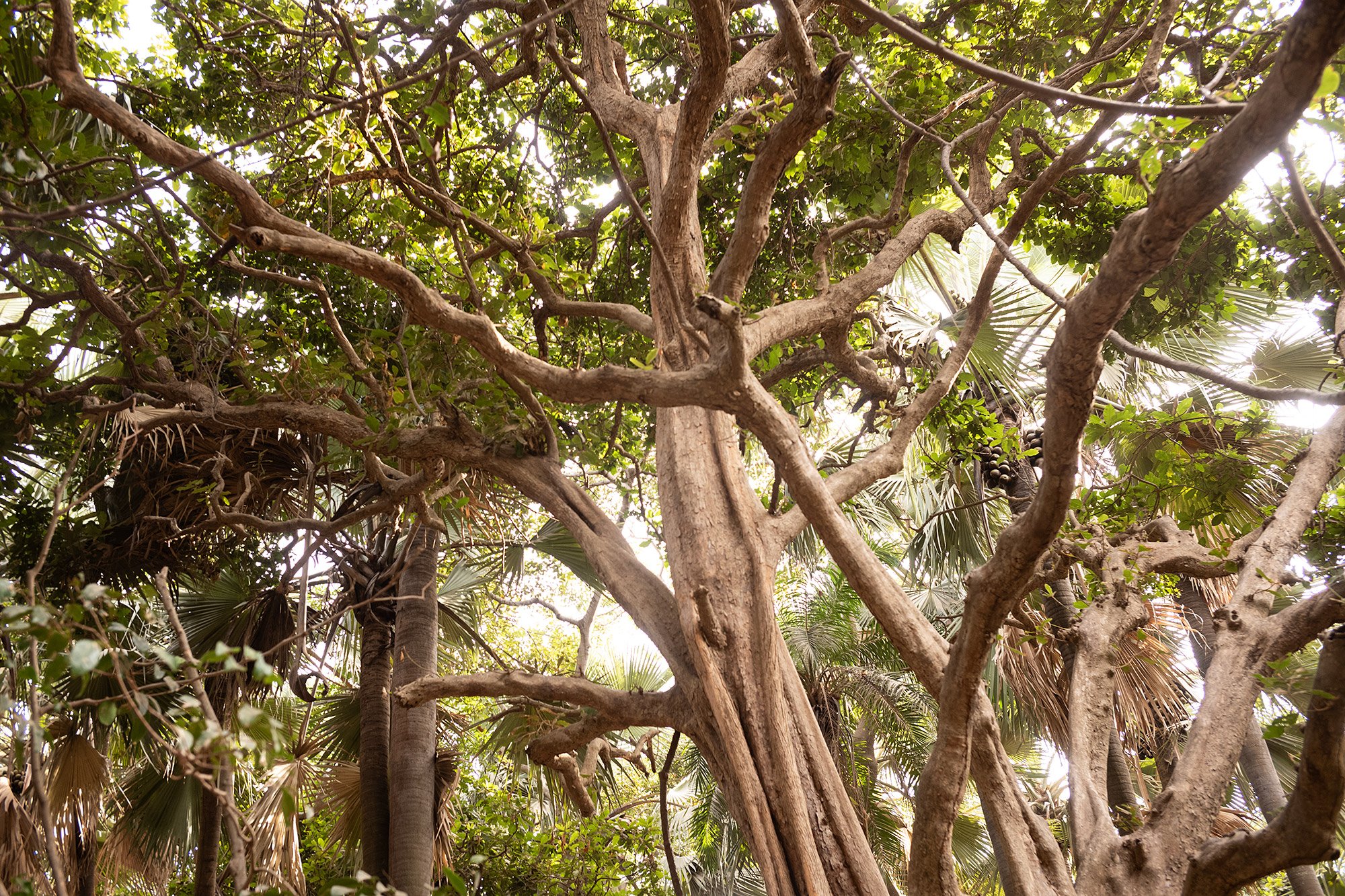
Ahead we see a group of people standing by a tree. Nearby we come across monkeys. Ibrahima(2) hands me a chunk of banana and the monkeys come near to take it from me. He holds a piece of banana by his shoulder and a monkey jumps from a nearby tree onto his back to take it from his hands. He hands me a piece and gestures for me to do the same.
Soon I have monkeys perched on each of my shoulders. I’m surprised how much joy it brings me. I can feel their soft fur against my cheeks and I can’t stop smiling. I take selfies with the monkeys, they look off into the distance.
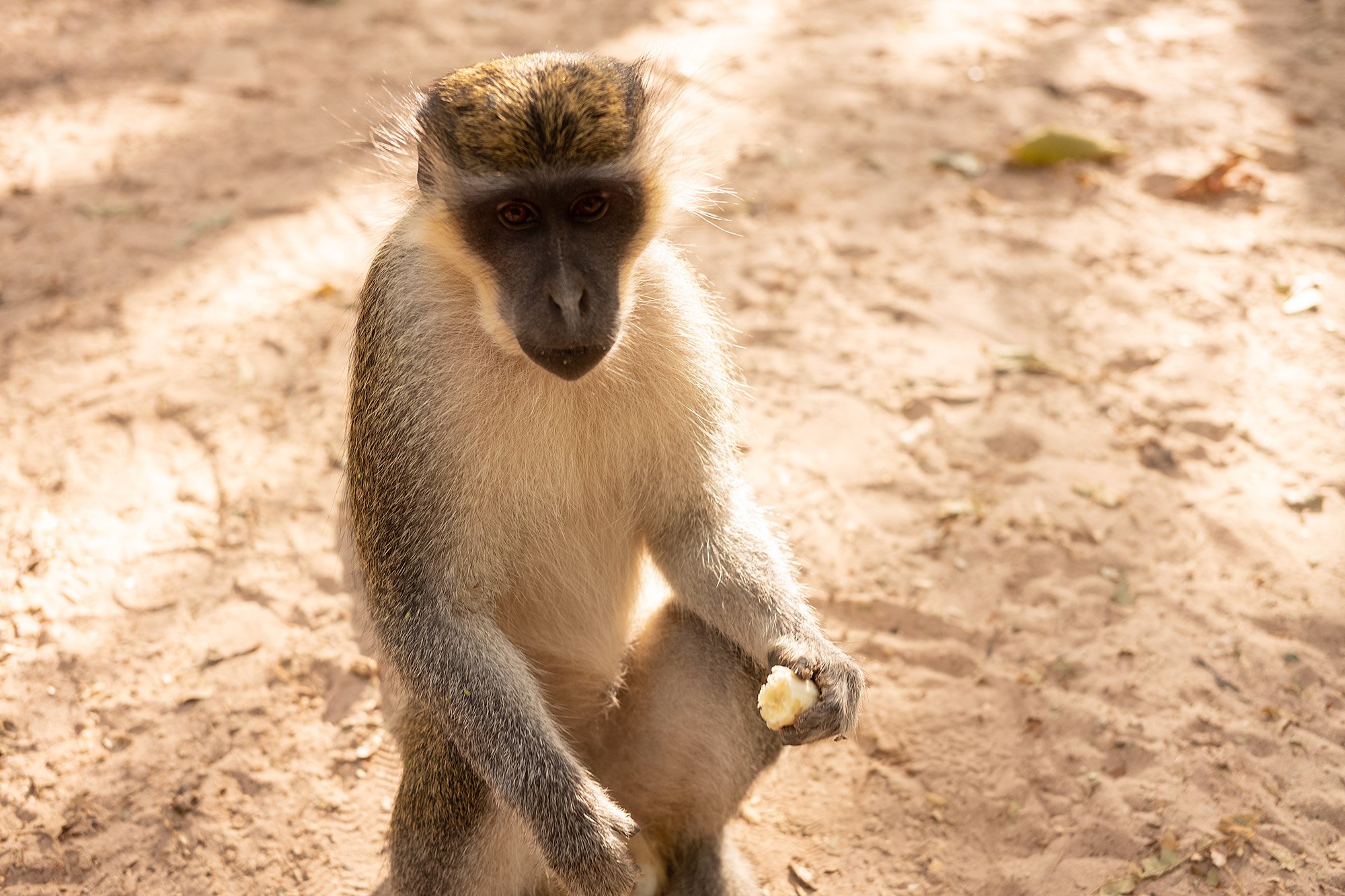
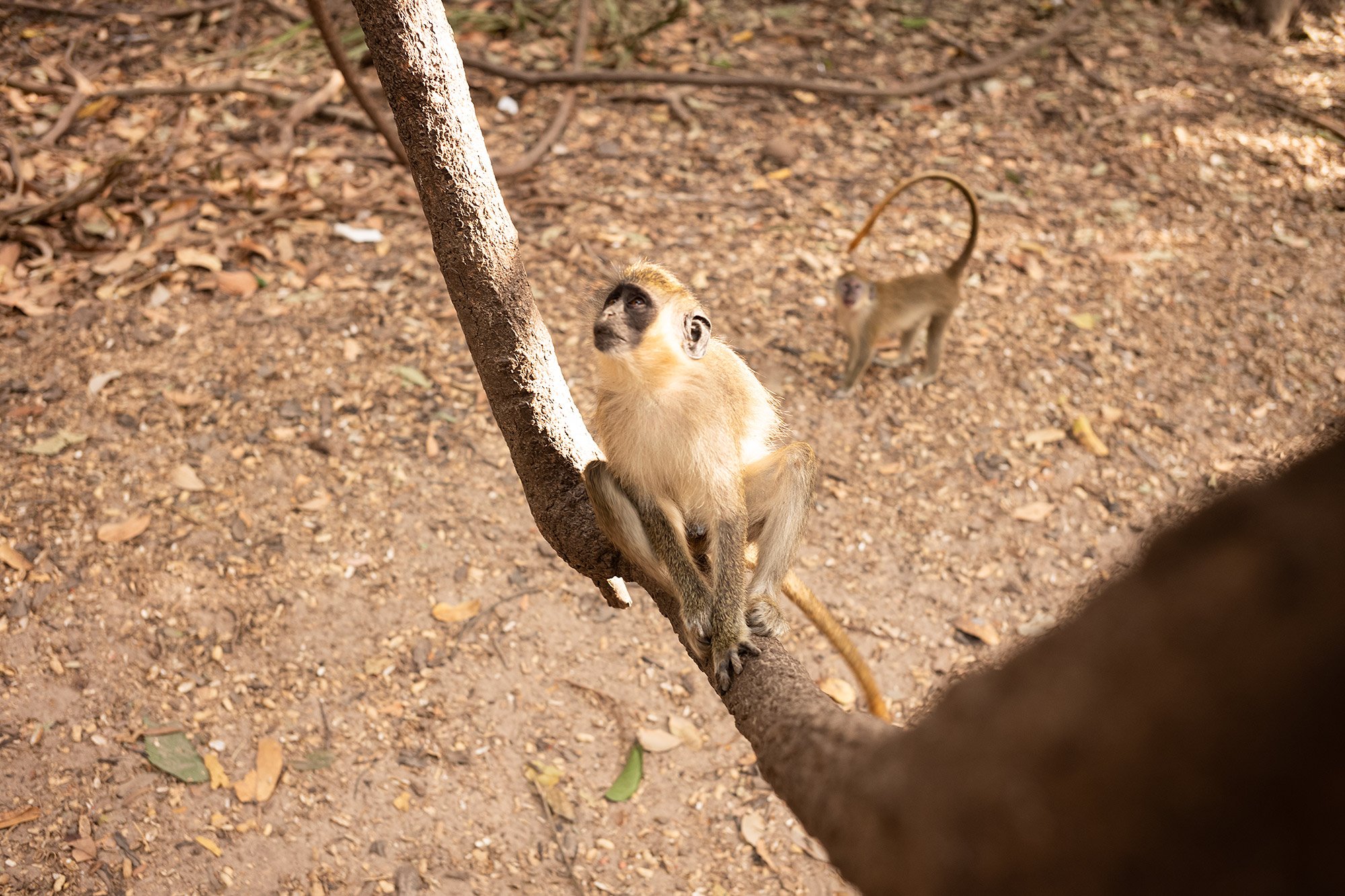
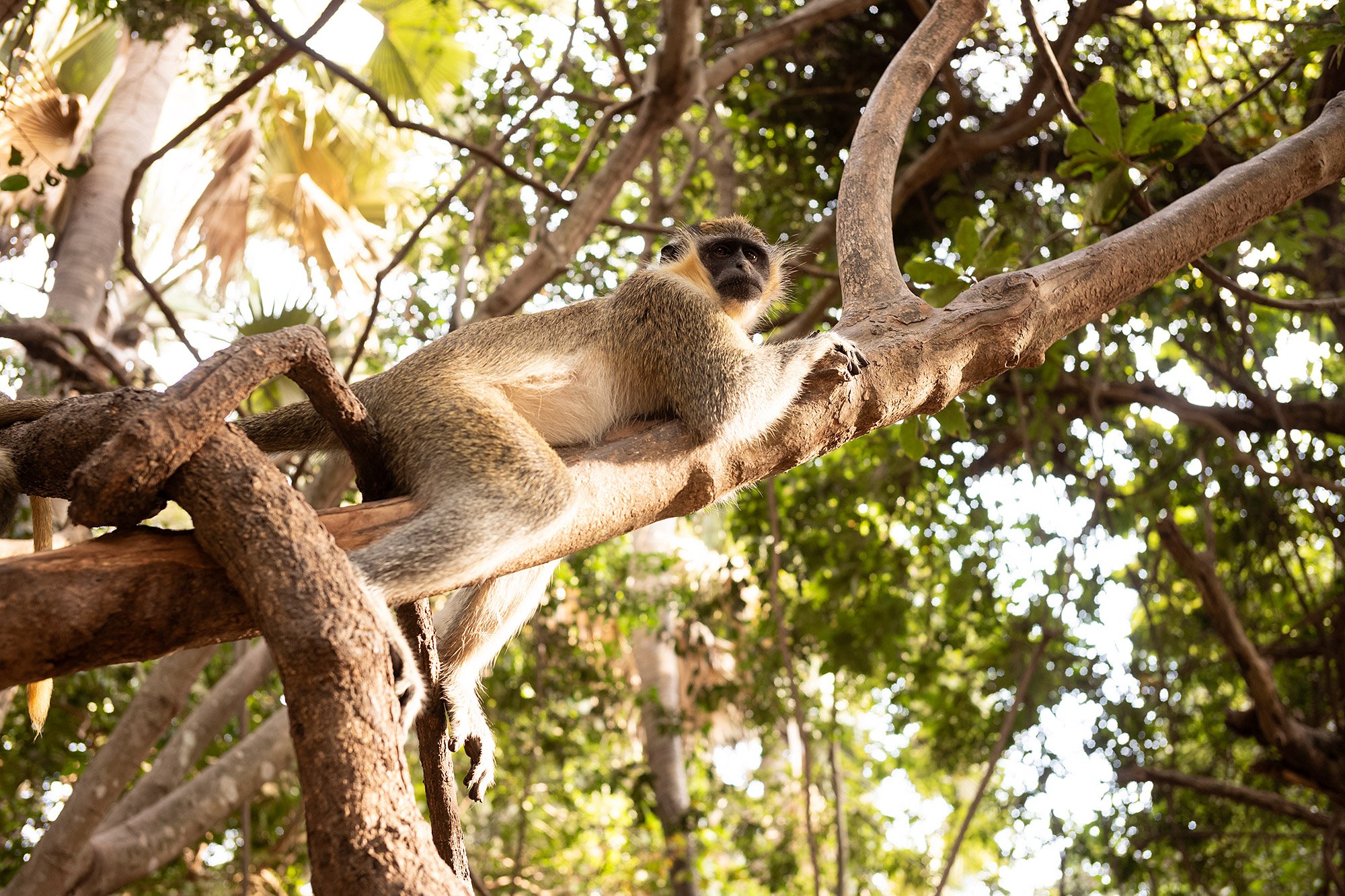

From the Bijilo Forest Park we continue driving south to the Tanji fishing village. Ibrahima(2) parks the car by the side of the road and leads me through a fish market stacked with coolers to the beach.
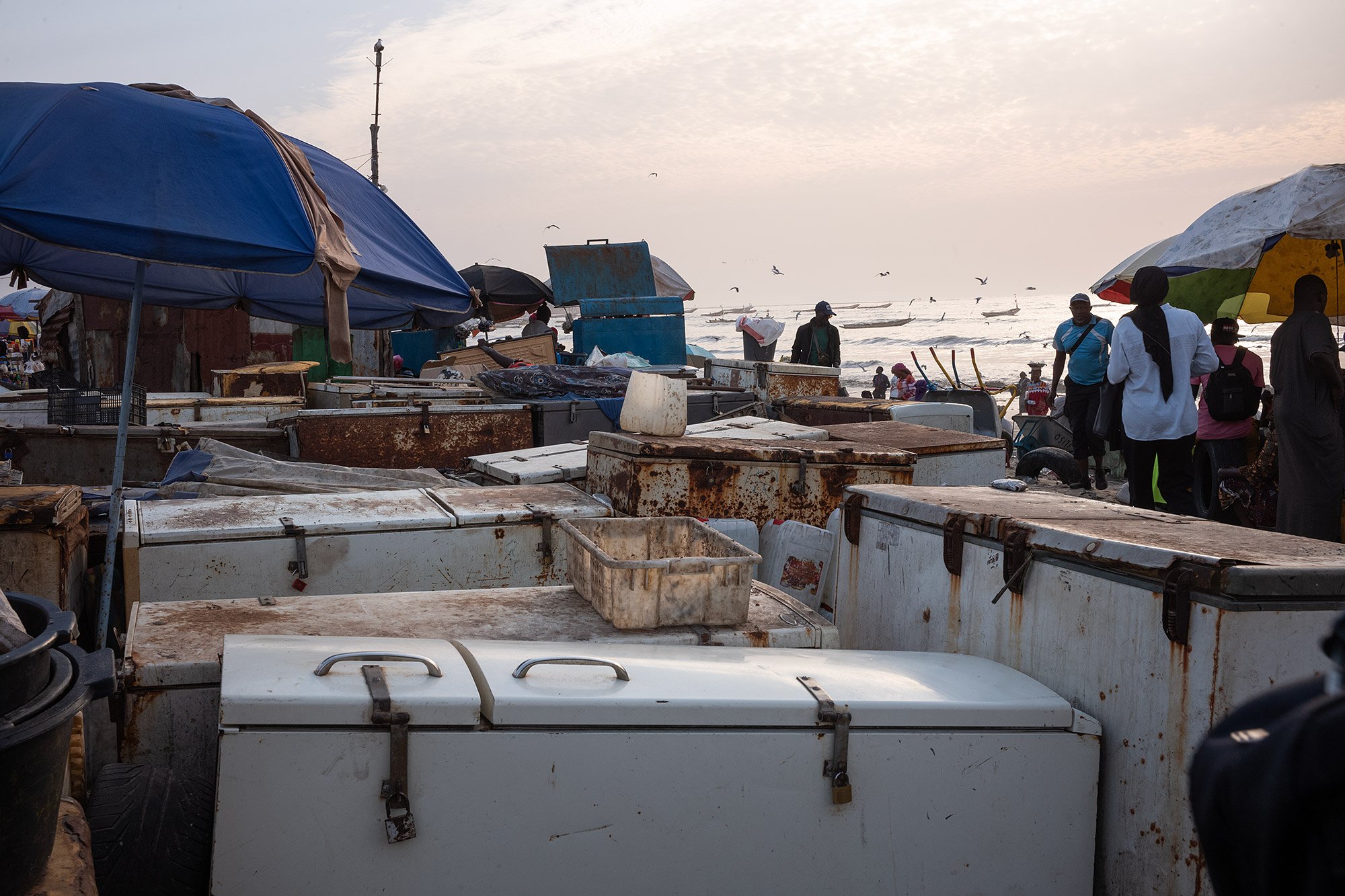
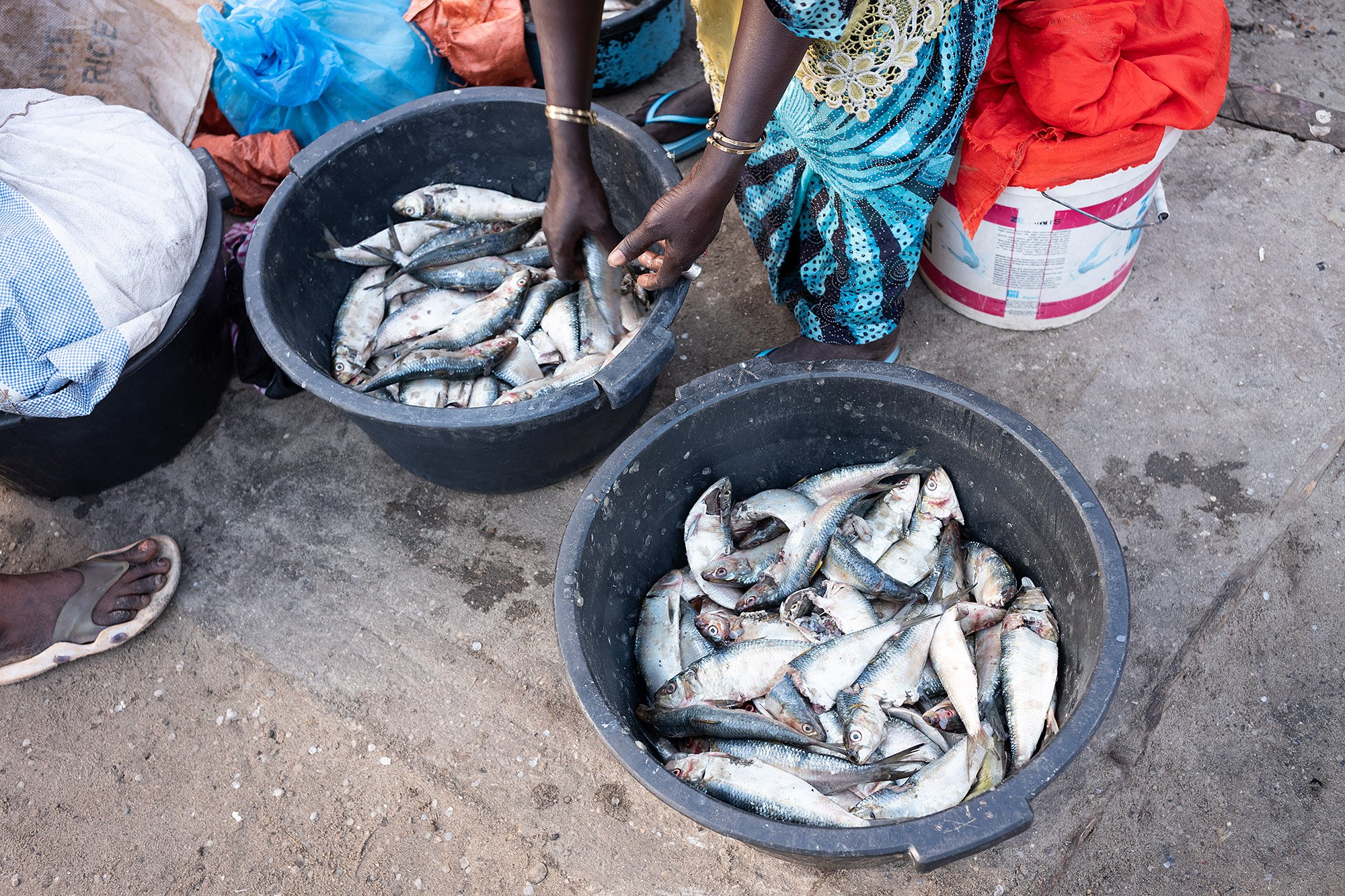

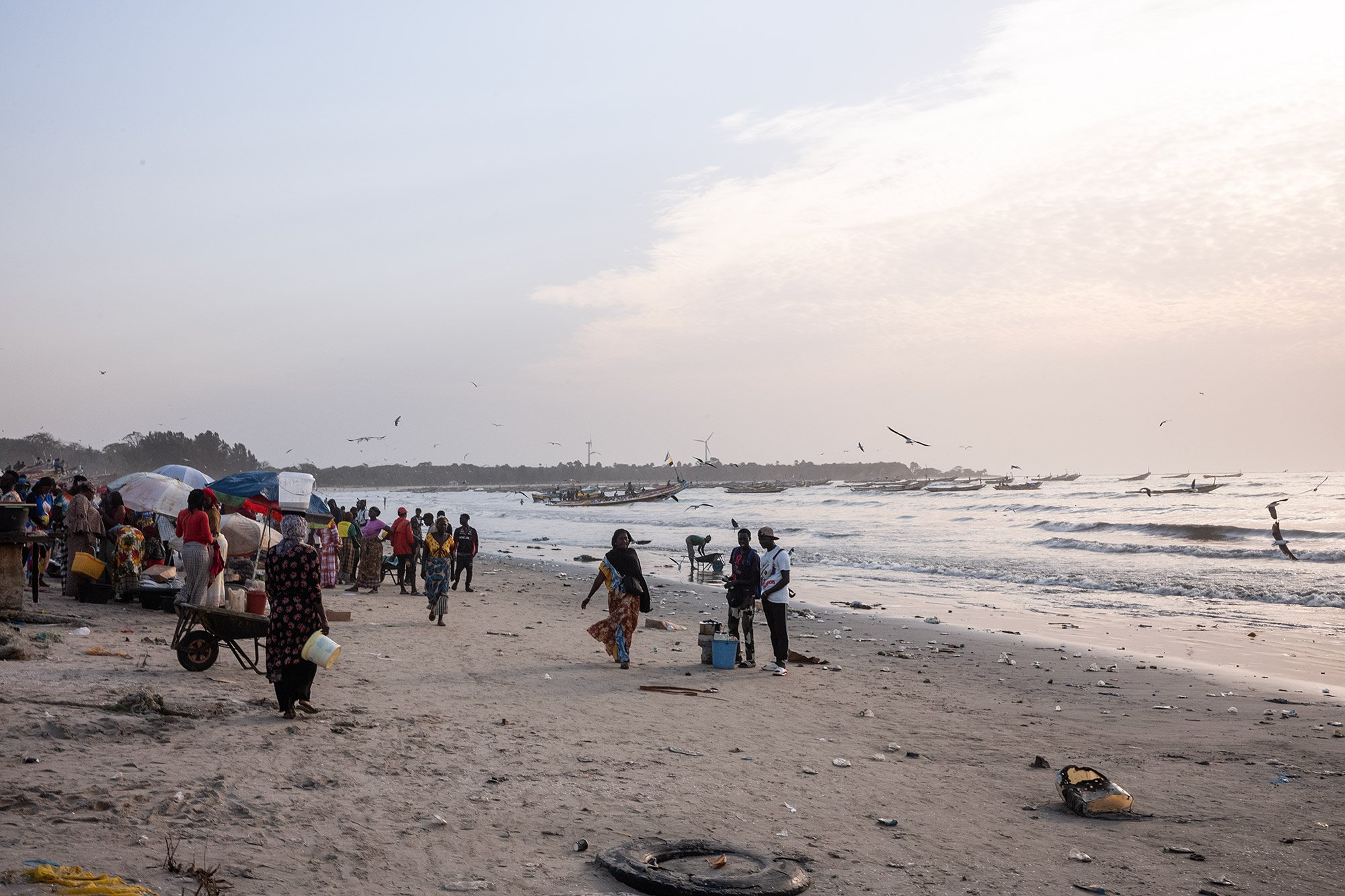
Birds swarm along the beach as we walk south past boats dry docked on the sand. In the distance a boat is being loaded in preparation to head out to sea and we walk towards it to watch the proceedings.

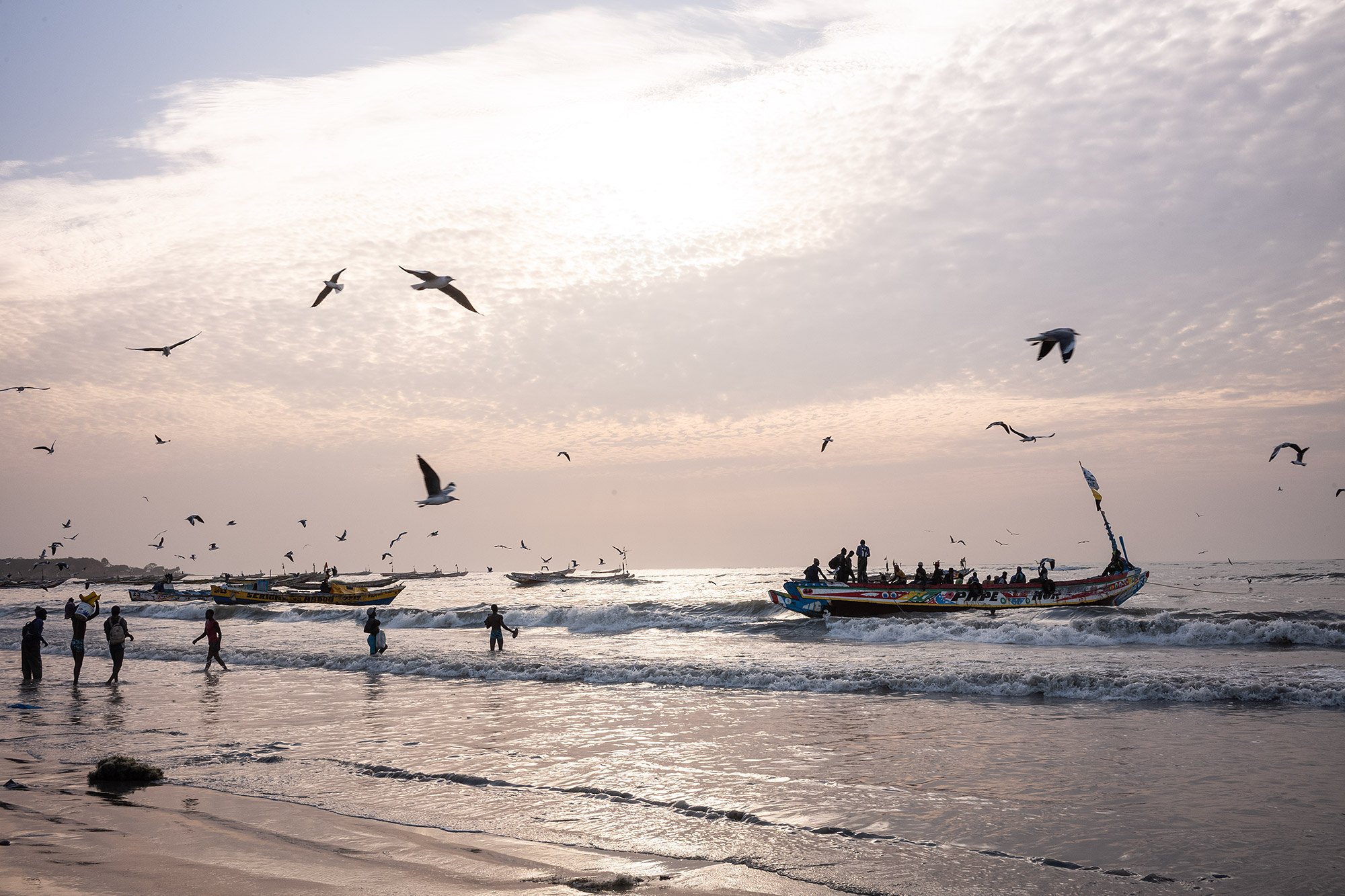
We stand near the boat as it’s being loaded. It’s a laborious process as people and provisions are shuttled back and forth across the surf. Once it sets sail it won’t be back in the morning. Ibrahima(2) tells me that all of the fishing boats from The Gambia leave from this beach, some headed as far as Europe to fish the Mediterranean Sea. Seeing how many people have been crammed onto the boat and thinking about the distances I can’t imagine being on such a voyage.



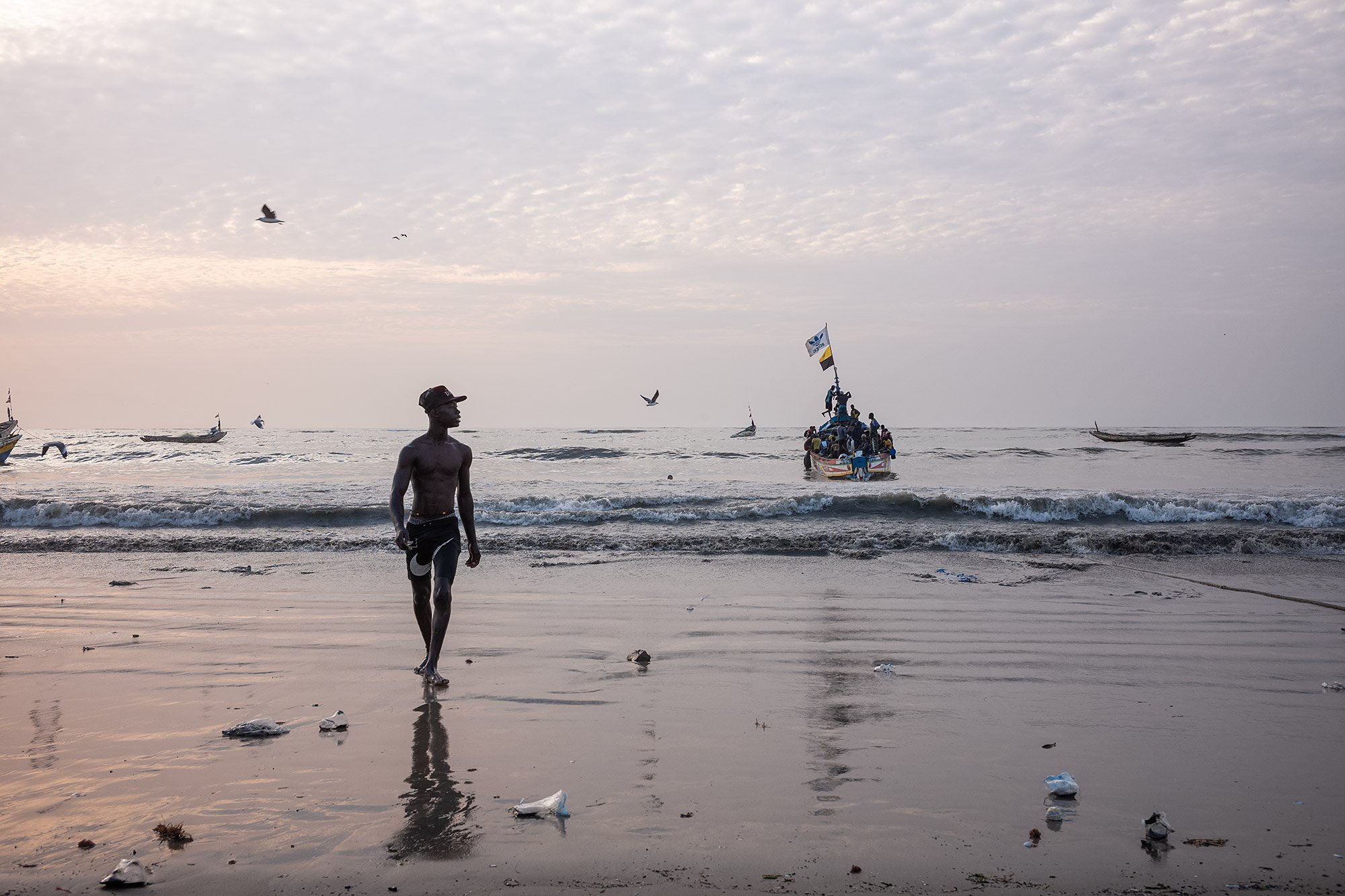
Walking back along the beach towards the car Ibrahima(2) tells me he can’t wait until Monday has passed. He’s thinking about the futbol match vs Senegal. The Gambia is in a difficult group against some of the strongest sides; it’s only the second time The Gambia has qualified and he’s a ball of nerves. He would actually prefer not to watch the match; he wants only to know the outcome.
Nearing the car Ibrahima(2) points to a boat flying the US flag. It’s surprising to see something so familiar appear so suddenly unexpectedly. I laugh at the incongruity.
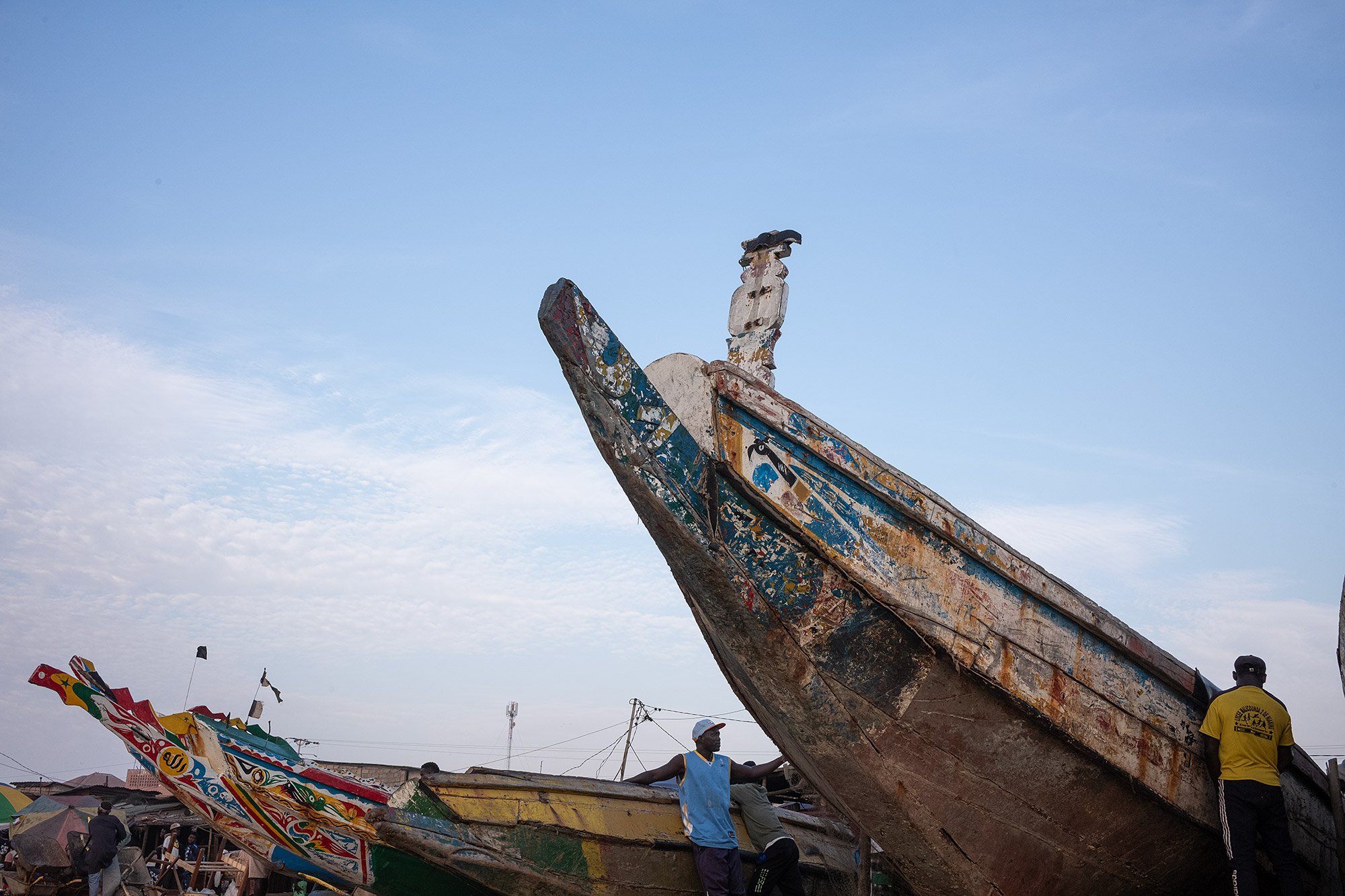
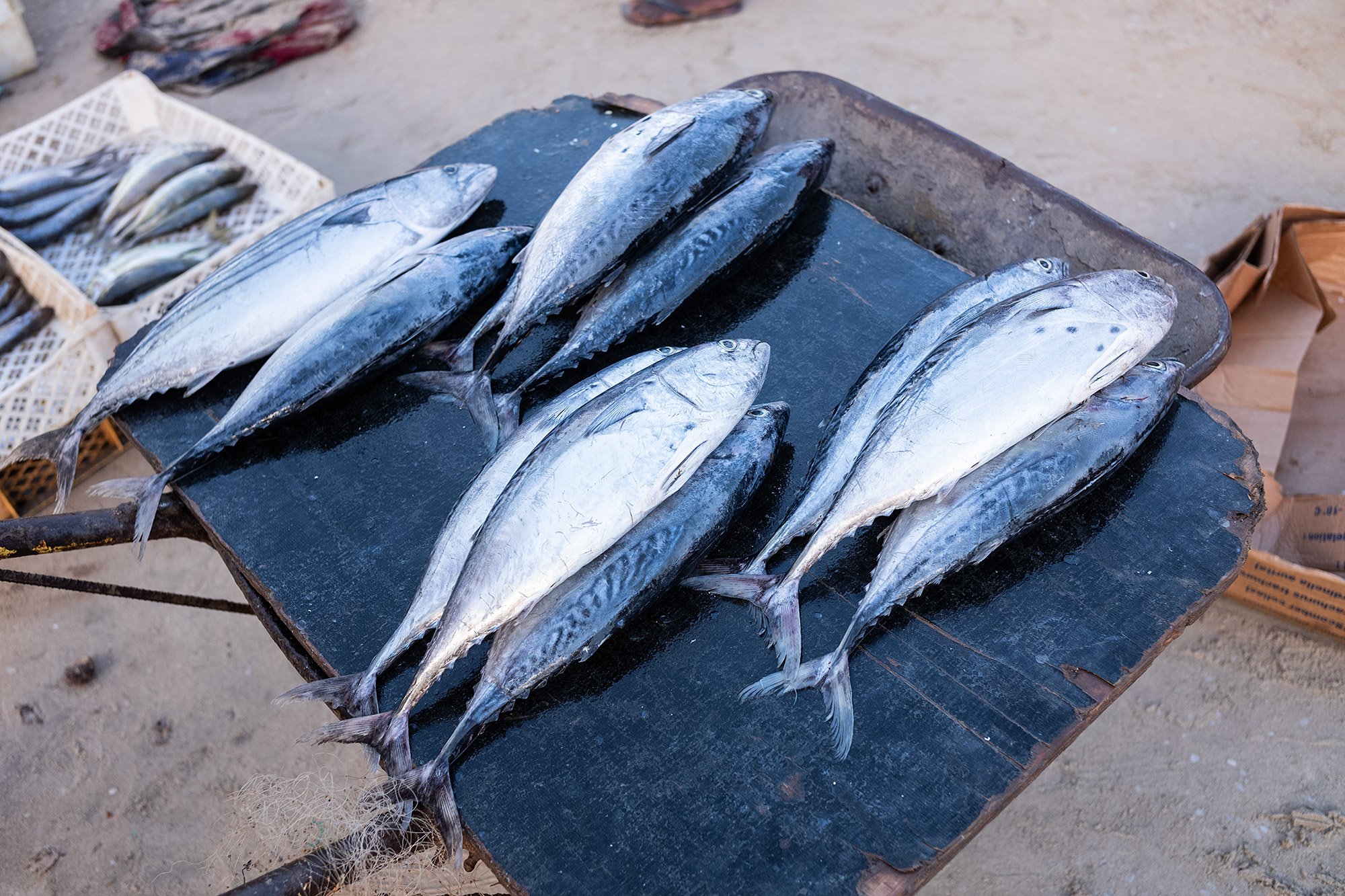
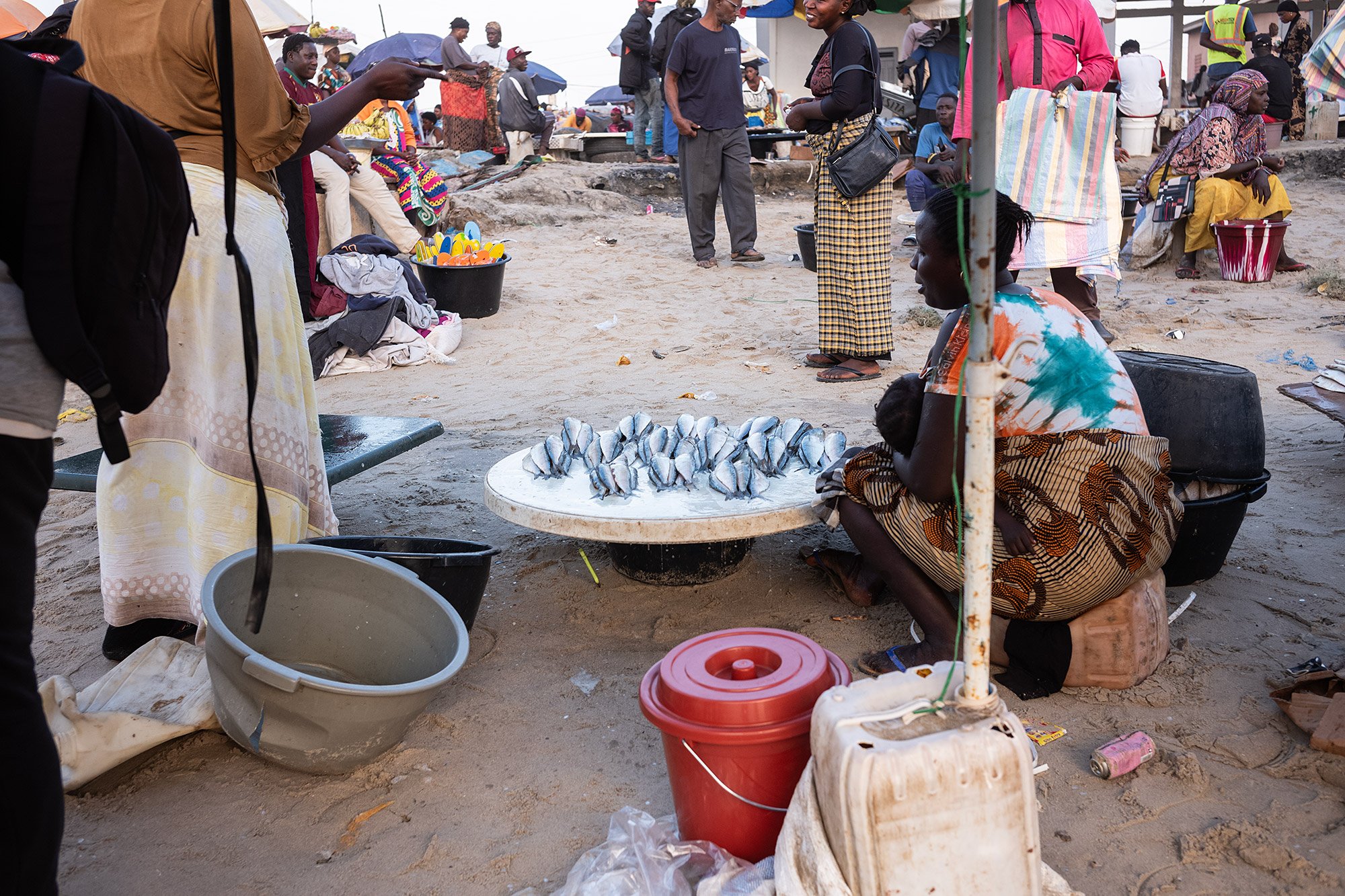
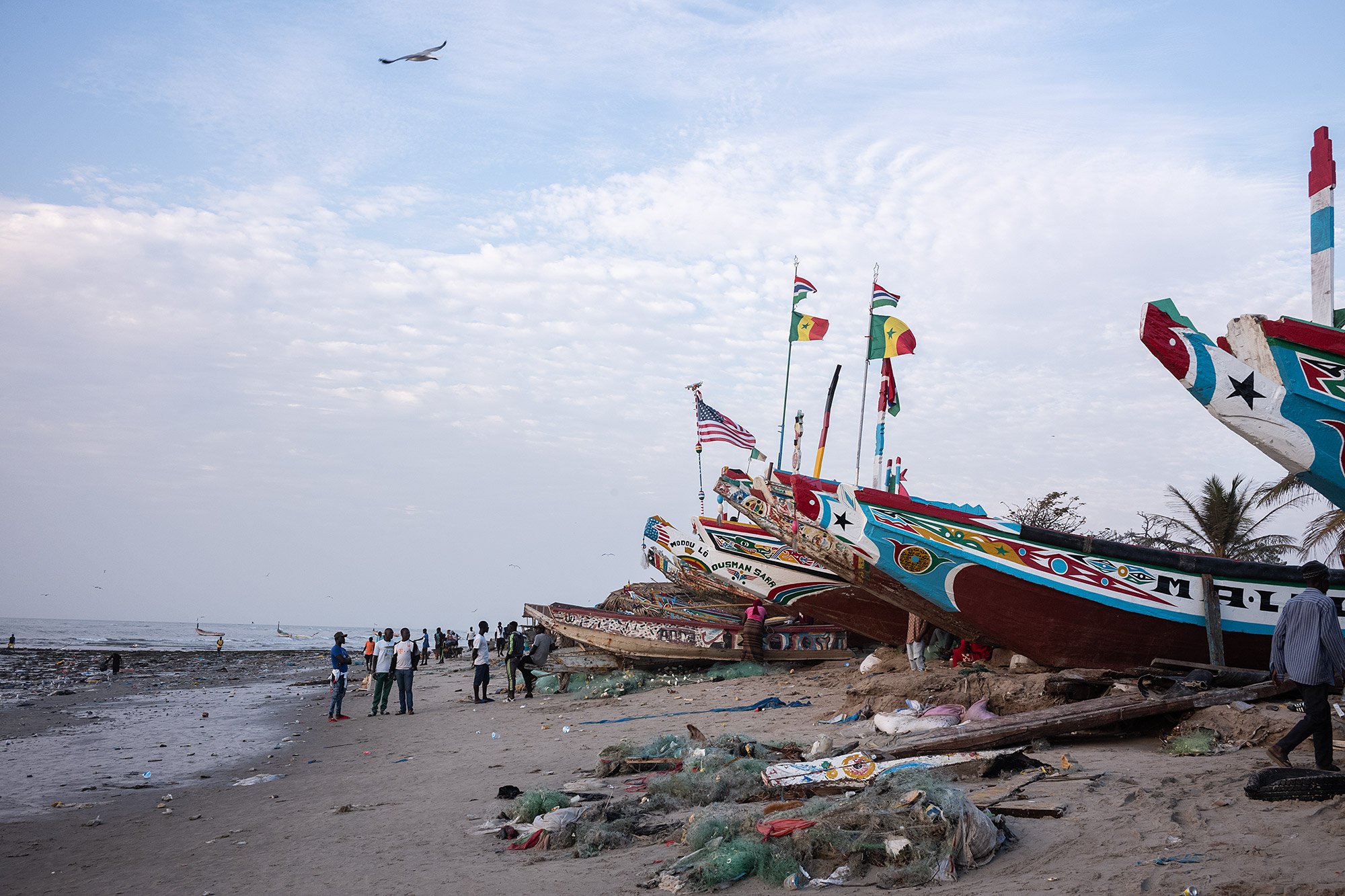
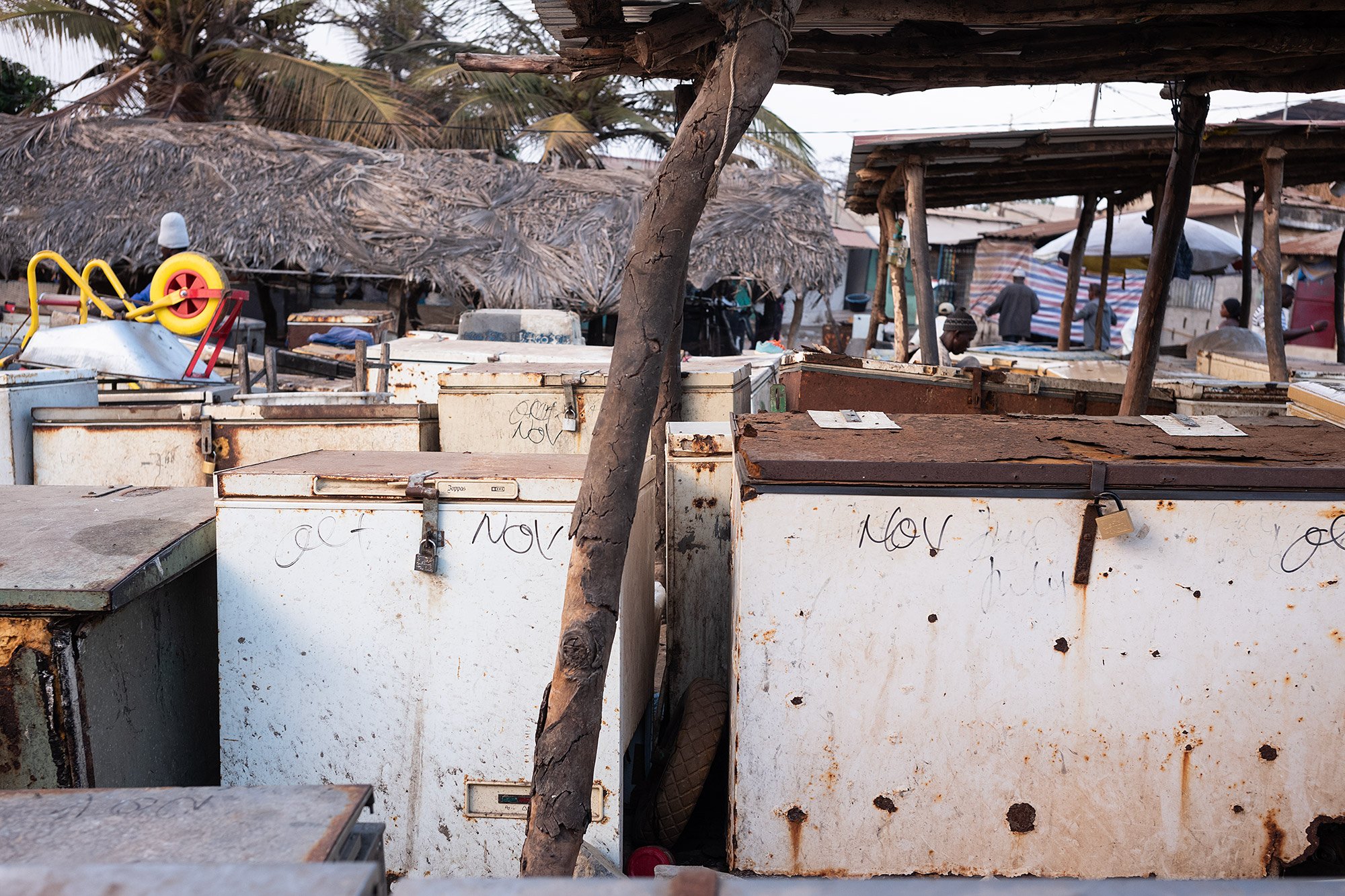
We drive back along the wide, paved road. I ask Ibrahima(2) if the road ever gets packed. During events, he tells me. Or at the roundabout if there’s no police to direct traffic. And then, as if on cue, the traffic slows to a stop. We crawl along until we reach the roundabout after which the traffic clears, just as Ibrahima(2) had described.
The hour is getting late when we reach the hotel in Serrekunda. Ibrahima(2) tells me what it was once one of the best hotels in the area, though it’s showing its age a bit now. He tells him his father used to taxi tourists here. He tells me he has an auto mechanics degree, and drove taxis like his dad for a while before deciding to be a guide six years ago.
I check in and am shown to my room. I change into swim trunks and head to the beach. The waves are too strong to swim in and evening will be arriving soon. I wade into the water and watch the light play out against the sky, reflected in the shallows by my feet. It’s a beautiful dusk and I feel fortunate to have been able to bear witness to it. Couples and small groups wander the beach headed to or from one hotel or another.
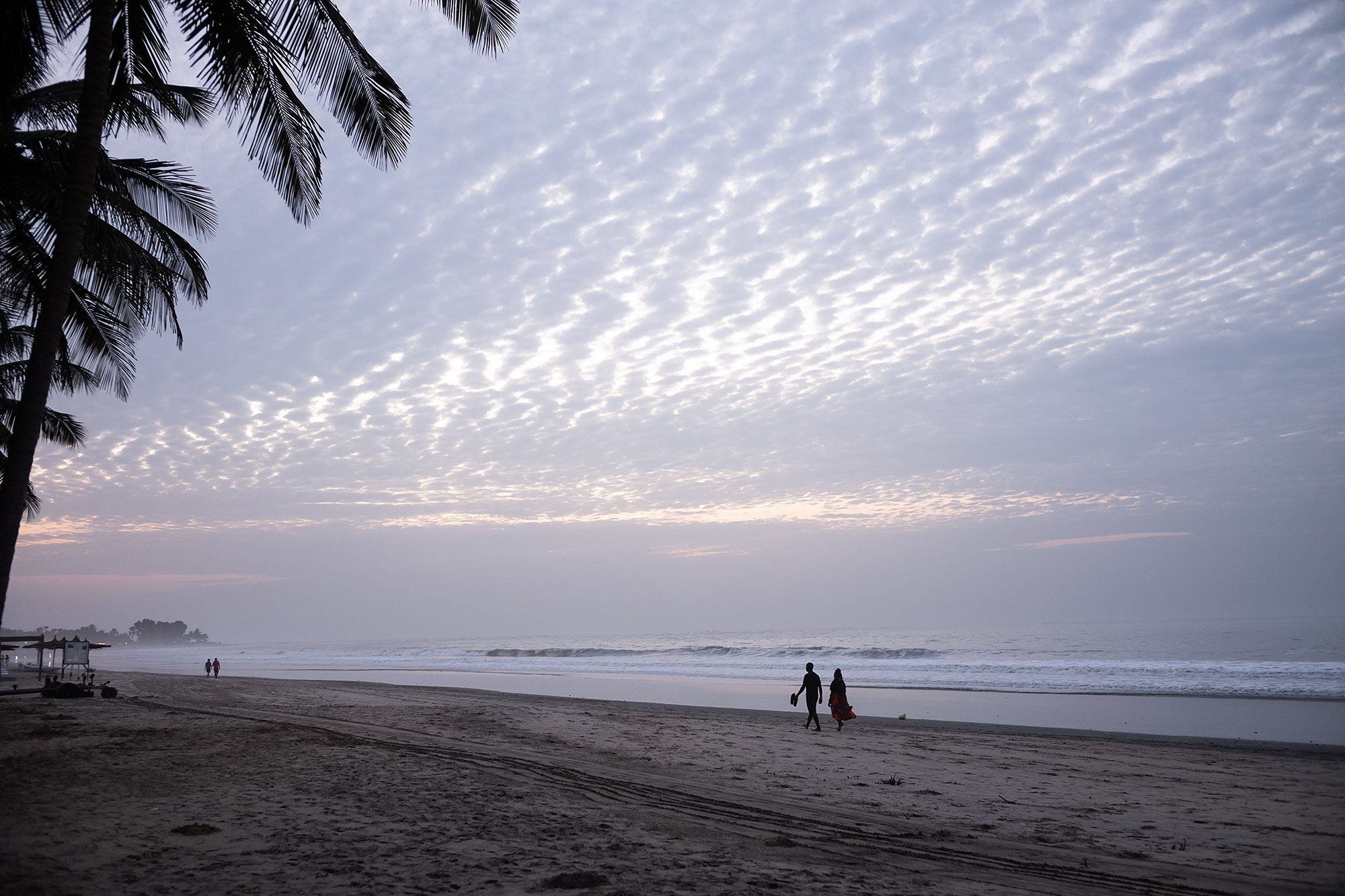
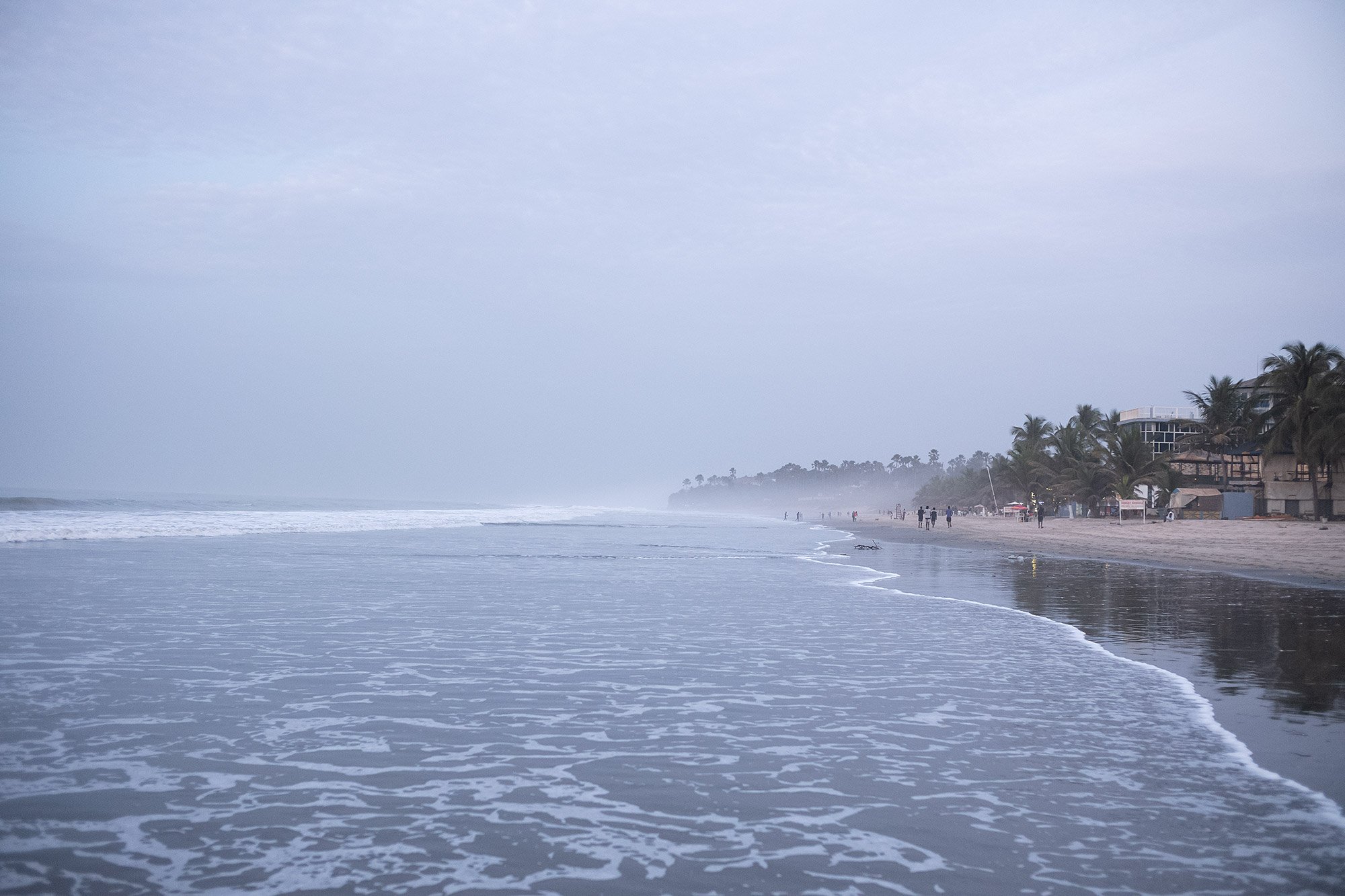
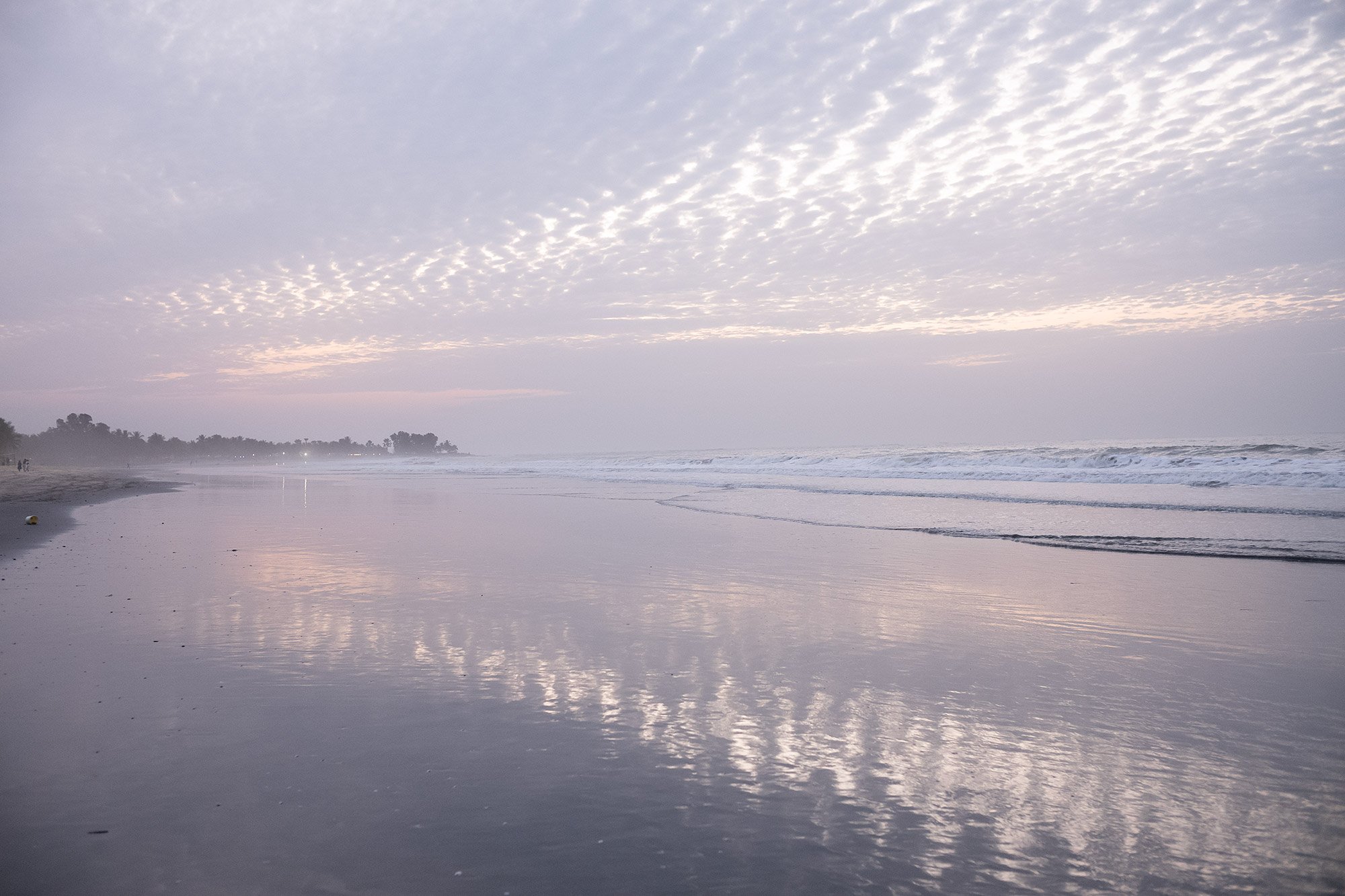
I head to the hotel pool to swim a few laps. A sign tells me it’s closing in a minute but I decide to push my luck. A hotel employee approaches as I swim and I prepare myself to be kicked out of the pool, but he stops me only to ask how many laps I’ve swum. He’s impressed by the number, though it’s really not that much.
I pull myself out of the water after a few more laps and dry myself off before walking through the outdoor restaurant that sits at one end of the pool. I check the menu and debate sitting at a table and ordering food. It’s been a long day and I’m more interested in going to bed as early as possible. I had the menu back to the bartender and tell him I’ll think about it.
Back in my room I eat leftover cassava and beans. I’m showered and in bed by 21h. 🇬🇲
13 January 2024
